Portraits of Pride
Also inside, p. 12:
The INDY’s 2023 Endorsements: Durham Municipal Election
For Pride: Durham, NC, LGBTQ Center staff
share their stories (By Desmera Gatewood, p. 17); Queer entrepreneur Beverly Tan wants to be your neighborhood Spider-Man (By Jasmine Gallup, p. 32)

 Raleigh | Durham | Chapel Hill September
Raleigh | Durham | Chapel Hill September
20, 2023
Raleigh Durham Chapel Hill
CONTENTS
5 Four key questions that will play a role in shaping the outocme of Durham's municipal election. BY
MATT HARTMAN
12 The INDY's endorsements in Durham's upcoming municiapl primary election.
BY INDY STAFF
15 The City of Raleigh is considering two new ordinances designed to rein in noise and address safety in the Glenwood South entertainment district.
BY HANNAH KAUFMAN
17 Portraits of Pride: Voices columnist Desmera Gatewood and LGBTQ Center of Durham staff share their reflections on Queerness, Pride, and what the Center means to them. BY
 LGBTQ CENTER OF DURHAM STAFF & DESMERA GATEWOOD
LGBTQ CENTER OF DURHAM STAFF & DESMERA GATEWOOD
32 How Hollywood casting director and local entrepreneur Beverly Tan shows up for the Queer community. BY
JASMINE GALLUP
ARTS & CULTURE
34 Durham duo Viv & Riley's new album, Imaginary People, charts the non-linear paths of growing older. BY
NICK MCGREGOR
36 "I think there's less of a Mipso sound and more of a Mipso process," says guitarist Joseph Terrell of the band's sixth album. BY
 SPENCER GRIFFITH
SPENCER GRIFFITH
38 Kenneth Branagh's latest Agatha Christie adaptation is his best yet.
BY GLENN MCDONALD
40 Zelda Lockhart explores generational wounds in both her novels and expressive arts therapy practice. BY
SHELBI POLK
THE REGULARS
3 Backtalk 4 15 Minutes

42 Culture calendar
CORRECTION In our 15 Minutes Q&A with Kaitlyn Wesdock published August 23, we incorrectly identified her as a Girl Scout. She is in fact a member of one of Raleigh’s inaugural Scouts BSA troops.
COVER Desmera Gatewood PHOTO BY DERRICK BEASLEY
WE MADE THIS
PUBLISHER
John Hurld
EDITORIAL
Editor in Chief
Jane Porter
Culture Editor
Sarah Edwards
Staff Writers
Jasmine Gallup
Lena Geller
Reporters
Justin Laidlaw
Chase Pellegrini de Paur
Contributors
Spencer Griffith, Carr Harkrader, Matt Hartman, Brian Howe, Kyesha Jennings, Jordan Lawrence, Glenn McDonald, Thomasi
McDonald, Nick McGregor, Gabi Mendick, Shelbi Polk, Dan Ruccia, Harris Wheless, Byron Woods, Barry Yeoman
Copy Editor
Iza Wojciechowska
Interns
Mariana Fabian, Hannah
Kaufman, Iris Miller
CREATIVE
Creative Director

Nicole Pajor Moore
Graphic Designer
Izzel Flores
Zulu and Soul Glo perform at Motorco Music Hall on Thursday, September 28. (See calendar, page 42.)
 PHOTO COURTESY OF MOTORCO
PHOTO COURTESY OF MOTORCO
ADVERTISING
Publisher
John Hurld
Director of Revenue
Mathias Marchington
Operations Assistant
Chelsey Koch
CIRCULATION
Berry Media Group
MEMBERSHIP/ SUBSCRIPTIONS
John Hurld
INDY Week | indyweek.com
P.O. Box 1772 • Durham, N.C. 27702 919-666-7229
EMAIL ADDRESSES first initial[no space]last name@indyweek.com
2 September 20,
INDYweek.com
2023
ADVERTISING SALES advertising@indyweek.com 919-666-7229 Contents © 2023 ZM INDY, LLC All rights reserved. Material may not be reproduced without permission. NEWS
VOL. 40 NO. 29
B A C K T A L
Two weeks ago, we published the third installment in a four-part series from writer Matt Hartman on Durham’s upcoming municipal election. The story focused on the issues of housing, development, and gentrification and how the developer-proposed SCAD amendments could shape the mayoral and city council races. Our readers had thoughts.
From reader, former Durham deputy city attorney, and current city council at-large candidate SHERRI ZANN ROSENTHAL, via email:
One of the problems with SCAD, the private developer proposal to re-write Durham’s development ordinance, is that there are many devils in the details. Even provisions that its supporters promote as being “new urbanist” turn out to be problematic.
One example is the provision touted by developer Aaron Lubeck as “limiting” some parcels to 20,000 square feet. In face-to-face meetings, Jim Anthony, Lubeck and Bob Chapman tried to say this would allow “neighborhood coffee shops”. Coffee shops are typically about 3,000-5,000 square feet. Worse, the way this “20,000 limit” provision is actually written would allow many such parcels to be linked up. By pencilling in lot lines of 20,000 square feet or less, a strip mall could comply.
When I said to Jim Anthony that the 20,000 square feet didn’t match the kinds of small scale commercial they were talking about, his response was, “It’s really about providing the most flexibility to the developer.”
According to the Planning Director, the only person who can change any of the text language is the developer/applicant, Jim Anthony. At our

meetings, during which the Durham Interneighborhood Council team provided a list 22 problematic sections, there was no offer by Anthony to clarify ambiguous language or engage collaboratively with a rewrite.
During these meetings, I offered twice to write a straight-forward text amendment that would enable smallscale new urbanist development. There was zero response or even acknowledgment from Anthony or his team. My offer to draft this for free should have been of interest, since I am the former deputy city attorney. However, I don’t think they have any real interest in new urbanism, in walkable/bikeable/sustainable development. I believe that’s a smoke screen for what they really want: to deregulate most residential development and avoid reviews for emergency service, storm water, preservation of trees, etc.
Thank you for the article, especially to Matt Hartman for his work. However, the article would have been better if there was specific counterpoint included to Aaron Lubeck’s sales pitch.
Be sure to check out the final installment in Hartman’s series on page 5 that asks four crucial questions heading into early voting for the municipal primary this week.
INDYweek.com September 20, 2023 3
K
WANT TO SEE YOUR NAME IN BOLD? indyweek.com backtalk@indyweek.com @INDYWeekNC @indyweek
Durham
15 MINUTES
Rebecca Feinglos

Former NC government worker, certified grief support specialist, and founder of Grieve Leave, a grief support group for millennials and Gen Z
BY IRIS MILLER backtalk@indyweek.com
Has working in the Triangle area shaped the way you’ve worked with grieving people?
I never thought I’d be doing an interview about my work in grief and loss. My path was so focused. North Carolina and Durham are my heart and soul. It’s where I was born, where my parents settled in 1972. I went to Duke and I left afterward, but always with the intention to come back. This is my home. I lost my mother when I was young and I always wanted to just do good for the world. I always imagined I would be in government some day. I got to what I wanted—being in government in North Carolina and being close to my father. And then everything changed when he died. I think about what it’s been like to be a grieving person in North Carolina; in my generation we didn’t talk about grief.
Do you think that’s somewhat being in the South, somewhat regional?
Totally. I looked for grief support groups, and the ones I found in the Triangle are in churches. I’m Jewish—and even though some of them are interfaith, it wasn’t particularly appealing to me. I’m walking into a space where there are crosses all around me and a lot of church staff working—they’re wonderful, but that is not the environment that’s going to make me comfortable to talk about something as personal as loss. They’re clinical-feeling, people sitting in a circle. I was always the youngest person by decades. I would get mistaken for staff. And I hated it.
Particularly in the South, we have such a dearth of grief support for this inter-generation, the generation in between.
We’re not supposed to be grieving yet. Little kids, whose parents die, there’s pediatric grief support. The elderly are supposed to have lost a loved one, so there are supports that exist for them. For anyone in between, there just isn’t anything. How can we make way for things like bereavement leave, a deeper understanding of grief?
The experience I felt grieving my father’s death and then grieving my divorce was that I was the only person in the entire world who has ever felt that way. I was walking my dogs the day after my dad died, and I remember—it was also the pandemic, so everything was pretty eerie—seeing people driving their cars and thinking, “No one has any idea that yesterday was the worst day of my life. And that my person is gone and that my world is over. No one knows.” But then I started thinking, “Well, that person driving their car, maybe their loved one just died.” The more I talked about grief, the more I realized we all don’t want to talk about this thing that is actually everywhere, all the time. Everyone feels better when they feel like they’re normal and not crazy. That’s an innately human thing. That’s what grief is!
How would you define grief?
The collection of feelings that come with a loss. It’s not just one feeling, not just sadness; sometimes it is anger, longing, joy. I will look at a picture of my dad and feel bittersweetness— he’s on my cell phone background. And I love looking at him, and I miss him so much, and that is OK. All of those feelings are grief.
When we think about grief, we immediately go to death. I want
to push on that, because we grieve all kinds of things. We grieve loss: the end of relationships. A year after my father died and I was an orphan at age 30, I decided to end my marriage. Even though it was my choice, I was grieving the divorce, grieving a marriage that didn’t turn out how I thought it would. We grieve ending friendships, a scary medical diagnosis, moving across the country, getting older, watching our parents get older … Periods of our lives.
All of this. All of these transitions. And every single person on earth grieved because of the pandemic. It changed everyone’s sense of what was normal.
How does a typical “meet and grieve” go? How’d those start?
I wanted to be in community with peers. I wanted to grab a beer with people and talk about our dead parents, or our breakups, whatever it was. Can we not think about ways to do grief support publicly? I came up with this idea of “meet and grieve”—it’s cute, a play on words. I was a kindergarten teacher, I like puns and rhymes. Whatever. It makes you really happy, and makes this scary thing of grief a little less scary. I specifically wanted to support local businesses that could bring people together. We hosted a meet and grieve at 321 Coffee for anyone grieving any kind of loss. There was no structure, no name tags, just people, coming together. You know that the person sitting across from you has some kind of grief, so you ask them about it. It was profound.
We put together another meet and grieve online, with Michelle Dempsey-Multack, who has written books on single mothers who have experienced divorce. And we had dozens of people from all over the world coming together to talk about breakup and divorce grief, which has never had a space created for it to talk about. I made one.
We did [another] meet and grieve at Current Wellness in Raleigh to have a movement-focused class. Something totally different. Research shows that when we move our bodies, processing grief that way, we feel better. It lightens us. What should you say to someone who’s grieving?
I’m thinking about anticipatory grief: what to say to someone who’s experiencing grief for someone who is still alive but cognitively, maybe, they’re not there. Or maybe their person is incarcerated and alive, but they’re not present. I faced anticipatory grief for my mom, because brain cancer destroys your brain. The thing about being there for someone who is grieving is literally just sitting with them and being present for whatever they are feeling, however they feel. “I’m so scared that my mom isn’t going to recognize me tomorrow.” You can listen to a friend say that, and say, “I’m so sorry, that sounds so scary. And I love you. And I hate that this is happening.” That is how you support someone who is grieving. What we don’t say is “At least you got to spend another day with her, at least she’s still alive.” We don’t need to tell them to look on the bright side or fix their grief. We don’t have to have an answer for them. Grief doesn’t have an answer. Sometimes, it just fucking sucks. W
This interview has been edited for length and clarity.
4 September 20, 2023 INDYweek.com
Rebecca Feinglos PHOTO COURTESY HCM MEDIA
The Running of the Bulls
Four key questions that will play a role in shaping the outcome of Durham’s municipal election
BY MATT HARTMAN backtalk@indyweek.com
It’s a Friday morning in early September, and Mike Woodard is sitting, legs crossed, at a table in front of Samuel & Sons barbershop. Dressed in the standard uniform of male politicians trying to look casual—khakis, a button-up, no tie, and no socks—he seems at ease. Like the front-runner he was assumed to be when he entered Durham’s mayoral race two months before.
The state senator and former Durham City Council member chose the Angier Avenue barbershop as a starting point for a tour of the surrounding East Durham neighborhood. The eponymous Samuel Jenkins is an old friend of Woodard’s. Later, the barber delivers water and chastises Woodard for throwing away a half-smoked cigar Jenkins left on the table.
When the tour begins in Woodard’s silver Audi, he turns off the jazz station and points to businesses, old and new, lining Angier and Driver Street. There’s Samuel & Sons, of course, which will soon be taken over by a nearby Latino barbershop after Jenkins retires. Ideal’s is a trendy sandwich spot whose patrons begin lining up before it opens each day. Joe’s Diner is a stalwart restaurant owned by Mayor Elaine O’Neal’s ex-husband, Joseph Bushfan; it now focuses on catering and hawks hot dogs from a tent out front.
Woodard loops past the newest businesses, Mike D’s BBQ and Congress Bar & Cafe, before pausing at an

empty lot around the block.
“Just a couple years ago, we had an open-air homeless place,” he says. “They took over this lot right here. This has just gotten cleaned up in the last couple of weeks. But you had four or five tents, guys sitting out here all day. Addicts were living here, is what we think was happening, but the dealers were coming and dealing fentanyl.”
A few blocks away, Woodard stops again in front of the encampment’s new location. Across the street, workers are building a row of nine new homes.
As Woodard concludes the drive, circling back past Rofhiwa—the Black-owned bookstore and coffee shop that’s still boarded up after a car crashed through its front window in a reported drug deal gone bad—it’s not entirely clear what impression he hopes to give. Is Durham on the right path? Does it need to change direction?
“I still think it’s both/and,” Woodard says.
“I thought it’d be helpful to see some of the investments and some of the things we have done,” he adds, getting out of the car. “And the challenges. What is the balance?
I don’t know.”
On the cusp of early voting for the primary, Durham seems split on the question, too. With a surprise strike by the city’s sanitation workers adding yet another twist to an already divisive election, consensus isn’t likely anytime soon.
The core issues shaping what voters think of the balance—city council scandals, holistic policing strategies, and ways to manage growth—were covered in the first three parts of this series. This final piece raises four key political questions. How voters answer them this fall will shape Durham’s future.
What matters more, policy or personality?
When her city council colleagues were debating whether to censure her for allegedly misusing city staff time to support her reelection campaign, Monique Holsey-Hyman was affronted.
“It’s troubling my heart,” she said during a March council meeting. “I put my name in the hat to help people, and I’m going to be 58 and I have won major awards. I have never in my life been sanctioned anything about ethics— in my entire life.”
“When I came on council, a lot of this was going on in terms of the tension,” Holsey-Hyman tells the INDY She was selected, she says, because her training as a social worker allows her to navigate emotionally fraught situations.
“That’s what people say to me: ‘Dr. Hyman, you listen to us. You treat us with respect,’” she says.
INDYweek.com September 20, 2023 5 N E W S Durham
PHOTOS VIA PEXELS AND UNSPLASH. ILLUSTRATION BY NICOLE PAJOR MOORE
Holsey-Hyman tells a story about the funeral of a murdered Hillside student to showcase what she’d like her campaign to focus on.
“Some of the young men came in,” she says. “They had ski masks. You could tell they were part of gangs. I said, ‘If you really want this man’s life to be something that you uplift, you’ve got to go back and do the right thing.’ And when I finished speaking, do you know that those same young men who came in with their pants down and their ski masks, they came and they hugged me? Because I’m someone that comes from the communities they are coming from.”
But Holsey-Hyman hasn’t been able to focus on those stories because her reelection campaign has unfolded under the shadow of scandal due to the censure, the Wikipedia ordeal, and the ongoing investigation into allegations that she solicited a bribe from a developer.
Her ally, council member and mayoral candidate DeDreana Freeman, is in a similar position. Also caught up in the Wikipedia scandal, and still dogged by allegations that she threw a punch at fellow council member Mark-Anthony Middleton, Freeman joins Holsey-Hyman in arguing that their policy positions and backgrounds are unfairly overshadowed.
In July, before she declared her intention to run for mayor, Freeman told the INDY she wants the election to focus less on candidates. “The issues stopped being the driver, and we have to get back to that,” she said.
It was never likely, given the context. As if to prove the point, someone has begun attaching placards to her campaign signs that read, “She’ll fight for Durham.”
Questions of character have shaped the election for every other candidate, too.
“I was surprised with how many interviews I went on for endorsements that asked about temperament,” says Khalilah Karim, a city council candidate running for one of three at-large seats. Has behavior become a priority over ideology and policy preferences?
The Friends of Durham—the most conservative of Durham’s major PACs and historically the home of the white business interests—endorsed progressive council member Javiera Caballero, who is seeking reelection, despite targeting her in the last election with a mailer claiming she and her progressive allies were putting the police “under assault.”
“Those of us who have known Javiera for a while now feel that she’s really matured into a complete council person,” says Dan Jewell, a long time Friends of Durham member who helped with their endorsements. “She gets it. And she seems to have shown the temperament in the last couple of months to at least not get riled in public and participate in all of the shenanigans.”
The group also chose not to endorse council member and mayoral candidate Leo Williams, a small business owner they backed in 2021, even though Jewell admits he
“fulfilled all of our expectations, if not even more.”
Instead, the Friends of Durham endorsed Woodard. They reasoned it would allow them to bring in more people with the right personality because Williams’s council seat is not up for election this year, meaning he’ll stay on council if he loses the mayoral race.
“We felt we needed as many steady hands and reasonable voices on the council as we can have,” Jewell says. “To us, it is a win-win.”
But Williams gained two other endorsements that seemed unthinkable before the campaign began. The self-described centrist is the progressive choice this year, winning recommendations from both of Durham’s progressive PACs, the People’s Alliance (PA) and Durham for All.
Positioning himself as a candidate able to unify Durhamites of all stripes, given the role he played for much of the past two years as the go-between for city council’s various blocs, it’s not a stretch to say Williams won their backing because of his basic competence and ability to maintain cordial relationships.
“He’s proven to be someone who’s steady and straightforward,” says Durham for All executive director Whit-
conspiracy theories targeting their political opponents, including Williams and Caballero.
As early as July 2022, five months before the Planning Commission voted on whether to recommend SCAD, the controversial amendments to the Unified Development Ordinance, Baker met with INC to discuss how to organize against it.
Baker has not propagated any of the conspiracy theories himself, but sources who attended the PA and Durham for All endorsement meetings report that he lost both votes due to his perceived connections to those who had. Baker wouldn’t address these sentiments in interviews.
“I have never had bad interactions with fellow planning commissioners,” Baker says. “In general, the planning commission has not been a toxic place. That is a body that has had a lot of very positive conversation.”
Are the PACs still the center of political power?
Going into the 2021 election, the PA was on a decadelong winning streak. Only a single of their endorsed municipal candidates had lost since 2009. In 2021, the Durham Committee on the Affairs of Black People (DCABP) slate dominated. After a tumultuous two years, the question is whether 2021 was a sea change, a blip, or a sign of something else altogether. The person best positioned to answer it is a man who has been endorsed by both organizations in eight previous elections: Mike Woodard.
ney Maxey. “We’ve never had to guess what his stance is. It’s important to have someone who has that kind of consistency but also has been reliable in his willingness to engage even if we don’t start out on the same page.”
Much of the opposition to Williams stems from feelings that the exact opposite is true.
Supporters of Freeman, his opponent in the mayoral race, have frequently used public comment periods at city council meetings to criticize Williams for what they see as rudeness. Even Holsey-Hyman echoes the complaint, though she doesn’t name Williams explicitly.
“That’s one thing I’ve had a little problem with,” she says. “The residents sometimes are not treated with respect when they come to our meetings.”
On the other hand, planning commissioner and city council candidate Nate Baker, a progressive who frequently names capitalism as the source of injustice, failed to receive endorsements from either progressive PAC. He’s seen as too friendly with problematic people with whom he aligns on development issues, sources say.
Activists connected to the InterNeighborhood Council (INC) and others have spread groundless or disproven
Coming back to Durham politics after 10 years in the state senate, Woodard’s pitch to voters is that he can bring a veteran presence the city needs to navigate this period—or perhaps just be the adult in the room.
On our tour of East Durham, he’s in his element as he rehashes the work done during his time on city council: small business grants, streetscape improvements, a failed pilot with an early ShotSpotter-like technology, the creation of the Holton Resource Center.
But experience hasn’t resonated the way many expected.
Though Woodard received the Friends of Durham endorsement, the group’s influence has waned. Only the PA and DCABP have real sway in Durham elections now, and for the first time in his career, neither supported Woodard. Himself a part of the PA’s old guard, Woodard received even fewer votes at the group’s endorsement meeting than Freeman, the paragon of the PA’s current opposition.
But Woodard is unfazed.
After O’Neal announced she would not seek reelection, Woodard says, he started getting phone calls. He kept a tally on a card that he stashed in his jacket pocket. After the 40th call, Woodard says he stopped counting.
“I know the people who contacted me and asked me
6 September 20, 2023 INDYweek.com
“We felt we needed as many steady hands and reasonable voices on the council as we can have. To us, it is a win-win.”
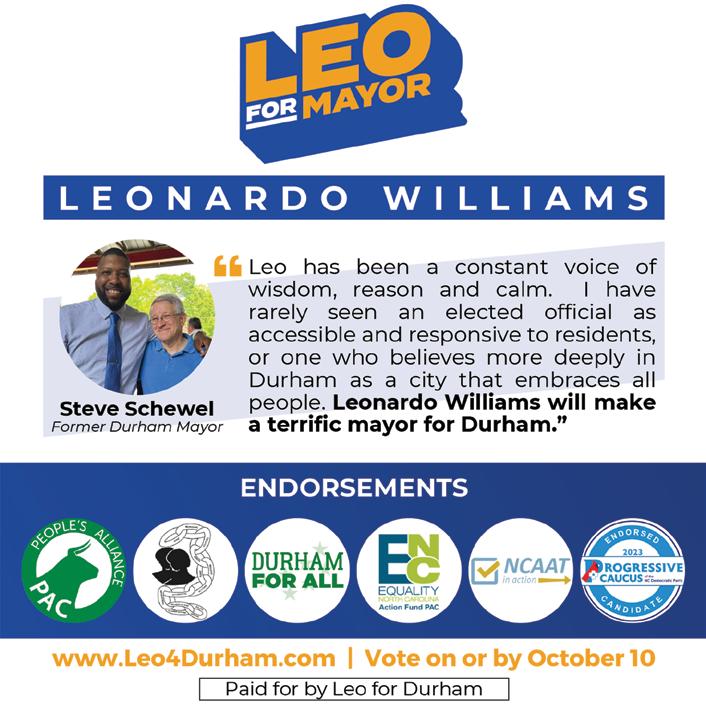




























INDYweek.com September 20, 2023 7 Donate Your Car Imagine the Di erence You Can Make Every donated vehicle will be properly recycled, reducing waste and harmful emissions. • Vehicle donations are fully tax-deductible and the proceeds help provide services to help the blind and visually impaired. Help Prevent Blindness Get A Vision Screening Annually TOWING & TAX DEDUCTIBLE When you donate your car, you’ll receive: Call 1-866-645-2280 a $200 restaurant voucher ✔ ✔ a 2-night, 3-day hotel stay at one of 50 locations
to run,” he says. “And I’m out in the community talking to folks, so I don’t worry about it a bit. I did not expect either of those two endorsements.”
Having raised more money so far than either Williams or Freeman, Woodard’s campaign is a test case in whether there’s an alternate route to the mayor’s seat. Instead of the major PACs, his campaign is premised on the support of influential community members, though Woodard declined to name anyone who asked him to run.
He’s not the only candidate trying to create a new base of political support outside the PA and DCABP either.
Freeman heads an unofficial slate of candidates who all have close ties to INC, including Bonita Green, INC’s president, who declined to participate in any endorsement process; Sherri Zann Rosenthal, a former assistant city attorney; and Baker.
“My feeling is that this is going to be a very different type of election than any other that Durham’s had,” Green says. “I don’t think this is an election that money can buy.” (Disclosure: Green and I are both board members of Dataworks NC.)
The likelihood of Green winning a seat seems remote— money may not buy an election, but it helps, and Green has raised less than $1,000. Rosenthal is faring better, raising just under $18,000, but that’s still only sixth most among the city council candidates.
The fundraising leader is longtime PA activist Carl Rist, with over $80,000 to his campaign thanks to deep connections across Durham. It’s enough to give the PA reason to believe it has righted the ship after 2021.
If INC’s backing alone isn’t enough, though, it might help push other candidates over the edge. With INC providing a tailwind alongside a DCABP endorsement, Baker’s campaign doesn’t seem particularly troubled without the PA. He’s second in money raised with nearly $40,000.
By combining support from development-skeptical progressives, INC, and DCABP, Baker’s candidacy raises a related but distinct quandary alongside Woodard’s: Are the centers of political power shifting?
In recent years, DCABP, the historic home of Black business and middle classes, has been aligned with Friends of Durham. Their endorsement lists have largely overlapped with moderate, business-friendly candidates pushing an enterprise- and building-centric approach to community development.
But as the current council has divided over housing and development, the slate DCABP endorsed two years ago split down the middle with O’Neal and Freeman on one side, joined by Holsey-Hyman after she was appointed, and with Williams and Middleton on the other.
This year, DCABP members seem split as a result, producing a variable slate of endorsed candidates. The Com-
mittee recommended Williams for mayor but Holsey-Hyman and Baker for city council, along with Shelia Huggins, an attorney and former Friends of Durham board chair.
“Our slate is like a holistic approach,” says DCABP PAC chair Cassandra Stokes. “Each candidate brings a different skill set that will be beneficial to the council.”
There isn’t a single substantive issue in Durham politics that the whole slate agrees on, from housing policy to police reform, but Stokes says that’s by design.
“All of those candidates in their expertise speak to a different issue that Durham has seen over the years,” she says. “That’s what makes a successful city council. Our slate reflects Durham—we have a mix of different backgrounds and people in different fields.”
But others say that it’s the result of an organization that’s become as contentious as Durham at large. The most notable critic is one of their own slate: Leo Williams.
“There are more good people who care about our community in the Committee than not,” Williams said in an interview with the INDY on the day he announced his candidacy for mayor. “But I would be a fool if I were to
the two puppet masters of council, along with Middleton. Now, Johnson will be leaving office. Her absence will shape both the city council and Durham’s progressive movement.
Observers are already pointing to the relatively short tenure of the current council members as one reason for its visible dysfunction and tension.
Johson has served the longest.
“You didn’t have a wealth of experience at that council,” says former mayor Bill Bell, who served 26 years as a county commissioner and 16 years as mayor.
“Even though I haven’t been on council in 11 years, I still have more council service than anybody else running,” says Woodard, who served from 2005 to 2013.
With community trust at a low point, the question is whether anyone can fill the gap.
Middleton, who succeeded Johnson as mayor pro tem, was assumed to be Durham’s next mayor-in-waiting before this election cycle. But he didn’t run, and he’s found himself in an antagonistic relationship with citizens at recent council meetings, telling critics repeatedly to run against him if they don’t like his positions and often eliciting jeers from the crowd.
Freeman, whose stature and influence grew during O’Neal’s term, is another possibility, should she become mayor, but her failure to receive major PAC endorsements indicates her support runs narrow, even if it also runs deep.
In either case, neither Middleton nor Freeman have had easy relationships with Durham progressives centered around the PA and Durham for All, so they’re looking for a way to transition into their next era. Still, progressives will have to replace their figurehead, and there’s no apparent successor.
pretend that there were not toxic people tarnishing the history and purpose of the Committee. That has implications. It wasn’t as bad when I was endorsed by the Committee [in 2021]. It’s really bad now.”
Who’s the progressive leader after Jillian Johnson leaves office?
When Jennifer Carroll, a member of Durham’s Community Safety and Wellness Task Force, was first getting involved in local politics, she knew little about the city council. “But I knew who Jillian was, because I live in Durham and I have eyes,” she says.
Since she was first elected in 2015, Johnson has been a dominant force in Durham politics—and not just among her progressive allies. She’s long been the boogeyman for political opponents, whether for her policy choices or influence in progressive organizations. After a contentious budget vote in June, Freeman even alluded to her as one of
Johnson has promised to stay involved in local politics but will have to support fellow progressives without the built-in bully pulpit of the council dais.
Caballero is a popular incumbent in her own right, and Rist’s fundraising haul speaks for itself, so there’s reason for Durham progressives to feel optimistic heading into the election. But a burden of uncertainty falls on Khalilah Karim. A former labor organizer now with the League of Conservation Voters, Karim is not nearly as well known as Caballero and Rist. She’s been labeled “the new Jillian” by supporters and opponents alike, and she seems to embrace the characterization.
“People have been talking about it,” Karim says. “I don’t take it in a negative way. I think about what Jillian has done in her terms on council, and I’m like, if only I can be as lucky to get as much done.”
Karim’s background—and Johnson’s support—were enough to win the PA and Durham for All endorsements, but PA sources say Baker nearly beat Karim to the third spot on the slate.
8 September 20, 2023 INDYweek.com
“All of those candidates in their expertise speak to a different issue that Durham has seen over the years. That’s what makes a successful city council. Our slate reflects Durham—we have a mix of different backgrounds and people in different fields.”


INDYweek.com September 20, 2023 9
Baker has won supporters among moderates and progressives alike by taking a more critical view of development issues that have been central to this election thus far. With growth taking center stage as Johnson steps out of the limelight, there’s reason to question whether her influence will carry as much weight as it once did.
Johnson spearheaded a successful slate with Caballero and Charlie Reece when she was on the campaign trail herself in 2019, but her support wasn’t enough to give Marion Johnson much success when she challenged Freeman in 2021. Rist, who earned her endorsement this year and supports the PA and Durham for All slate, says Johnson’s absence will leave a vacuum.
“From an organizing and intellectual perspective, she’s been a true leader,” he says.
Karim is focused on trying to carve out the space to be her own candidate.
“New leadership in itself doesn’t have to be bad,” she says. “A lot of the time people get used to seeing the same people in office, and I think we need to change that up, actually. We need to give space for a lot of different folks to run.”
What can voters realistically expect from city council?
Ten years ago, Durham was in the midst of an ugly political fight over development with many of the same talking points—and people—as today.
It started in 2005 with a change to Jordan Lake’s watershed boundaries, which enabled Southern Durham Development to plan a 1,300home project called 751 South that made a long and tortured journey through local government over the next eight years.
In June 2013, city council voted against annexing the project into city limits—the second time the request was denied. Southern Durham Development wanted annexation because it meant the city would provide water and sewer service. They weren’t taking no for an answer, and ultimately the General Assembly forced Durham to annex the property. 751 South officially became part of the City of Durham this June, around the same time that state lawmakers forced municipalities to extend utilities to charter schools after Durham’s city council refused to do so.
For many of Durham’s elected officials, those cases provide an essential lesson. It’s not just that North Carolina law strictly curtails local governments’ powers; it’s that lawmakers are quick to jump on the chance to punish blue cities that go too far.
The General Assembly can repeal a city charter, effectively legislating the city out of existence without the city’s residents getting a say in the matter, if it pleases. With a Republican supermajority in the legislature and control of the courts, things are only worse now. Statements about fiduciary responsibility make for
uninspiring campaign speeches, even when they’re true. But even those taking a more fiery approach admit the constraints.
Freeman says she would provoke a fight with the General Assembly in order to push the envelope on new strategies, especially around affordable housing—but only if voters are willing to bear the consequences.
“A thousand percent,” Freeman says, when asked if she’d be willing to risk a lawsuit. “As long as the city is willing to be taxed.
“You’re going to end up in court. And I would say that because the way the courts are in North Carolina, and now the Supreme Court in the country, it’s not likely that we would win, and so it would be an exercise in futility. But I’d be willing to be a test case.”
Her colleague on the council, Caballero, takes a different view.
“If you want to go poke the bear, go poke the bear,” she says. “I’m not going along with you on that suicide mission. Not now.”
But a city can control its budget, and that became a central issue this month as sanitation workers launched an unexpected strike.
employees get paid for work outside of their official duties.
“There were three of us that saw this day coming back in June,” O’Neal said at that meeting. “We had the opportunity and we tried, so I won’t take that it’s all of us. I won’t bear that burden. That has to be exactly where it is: on four.”
In the face of such direct attacks, the majority responded with appeals to pragmatism.
“If I’m being honest, I think we’re being borderline irresponsible right now,” Williams said to the workers. “I don’t want to position us to where we have a momentary sensation and fall apart later.”
The smarter thing to do, Williams argued, was ensure that any raise was sustainable, which required time. But ultimately, implementing the demand isn’t up to the council: day-to-day operations of city government are left to staff.
This weekend, city manager Wanda Page presented her plan, which calls for bonuses of up to $3,000 for all city workers. The lowest paid receive the most, but the union isn’t satisfied.
“Members of the Durham City Workers Union ... are sticking with the demand for the $5,000 bonus for all city employees making less than $75,000,” the organization said in a statement, noting their plan would cost roughly the same as Page’s.
Ironically, the strike gave a lifeline to Freeman and Holsey-Hyman while putting progressives on the back foot.
The seed was planted at the budget vote in June, when O’Neal belatedly asked for a raise for firefighters, less than two weeks before the city was required by law to have passed a balanced budget. It doesn’t appear the request was ever raised during budget negotiations, but at the meeting, confusion ensued. Council members asked if the raise was only for firefighters, other first responders, or all city staff. A majority—Johnson, Caballero, Williams, and Middleton—said they didn’t want to raise taxes beyond the increase that the county had already passed, especially without a clear plan.
Eventually, the council approved the budget without the additional raises, with the understanding that there would be a pay study and requisite wage increases next year.
It was the responsible option, the majority said.
The sanitation workers didn’t want to wait that long. UE150 (which didn’t make any specific budget requests earlier this year), showed up to the September 7 work session demanding immediate $5,000 bonuses, that temporary workers be hired as permanent staff, and that
If a compromise is reached that leaves all parties reasonably happy, Williams, Caballero, and their allies may end up looking like effective politicians who were able to usher protest into policy. But if the union remains unsatisfied, the council members’ critics will have the ammunition they need to write the next chapter in a story about Durham politicians being out of touch with the city’s working-class Black residents.
“We will proceed in regular order tonight,” Middleton said, presiding over a council meeting Monday in place of the absent O’Neal. It was a message to the sanitation workers lining the first row of council chambers following a pre-meeting rally: there would be no vote on the bonuses.
“We want to encourage everyone who can to attend on Thursday ... when her honor the mayor will be back and the full council will be in session to engage and do what we said we were going to do when we passed the budget,” Middleton told them.
It’s the same day early voting begins for the primary.
“Yes, you do deserve it,” Middleton added.
The meeting was paused as the workers filed out of the room. Then the council returned to the rest of its business and a mostly empty gallery. On the agenda: four public hearings on new development cases. W
This is the fourth story in a four-part series covering Durham’s upcoming municipal election.
10 September 20, 2023 INDYweek.com
“If you want to go poke the bear, go poke the bear. I’m not going along with you on that suicide mission. Not now.”




INDYweek.com September 20, 2023 11
The INDY’s 2023 Endorsements: Durham Municipal Election
By INDY staff


That’s why, this year, it feels crucial for voters to elect the right leaders to guide the city forward.
We at the INDY have our ideas of who those leaders should be. Last week, a team of three writers and two editors met with the goal of reaching a consensus on whom we should recommend to our readers to elect as mayor and at-large members of the council. We considered a variety of factors, including individual skill sets, past experience in governing and civic life, records of volunteerism, and the ability to work well with others.
We were able to reach a consensus without resorting to Plan A (ranked-choice voting) or Plan B (rolling the 20-sided Dungeons and Dragons die). Jokes aside, these were tough choices, but we made them in the good-faith belief that these four candidates will be best positioned to serve Durham during a difficult, transitional period in the Bull City’s evolution.
Durham may be a rough-and-tumble political town, in Schewel’s memorable words, but the former mayor added that “you really have to be able to roll with it.” And roll with it we will.
Here are the INDY’s 2023 picks for Durham mayor and three at-large seats on the city council.
Began Sunday, September 10, for the October 10, 2023, municipal primary and election
One-stop early voting will be held:
Begins Sunday, October 8, for the November 7, 2023, municipal election Thursday, September 21, to Saturday, October 7, for the October 10, 2023, municipal primary and election
Thursday, October 19, to Saturday, November 4, for the November 7, 2023 municipal election
Election Day polling places will be open from 6:30 a.m. to 7:30 p.m.
on
Day
Election
leonardo williams


Mayor Williams would be voted “most likely to show up” to any event touting the Bull City or highlighting the work of its people. No one gets out and about in the community more than he does.
In his two years on the city council, Leonardo Williams has shown a willingness to learn the ins and outs of city government, a desire to do the job of governing well, and an inclination to hold himself accountable to the residents he represents.
Probably the most accessible of all the council members, if community engagement were a high school superlative,
City Council at Large
javiera caballero
A veteran on the council since she was appointed in 2018 (and elected in 2019), Javiera Caballero has stayed above the fray when it comes to the drama at the dais and behind the scenes.
An independent thinker, Caballero understands the realities around the need for zoning reform to pave the way for more affordable housing. But while generally supportive of new development, she’s not a guaranteed yes vote for any given project. Rather, Caballero seems to consider the merits of proposals on a case-by-case basis, holds high standards for design quality and community benefits, and doesn’t shy away from negotiating with developers for the best achievable outcome for Durham residents.
Caballero understands the limits of what the city can legally do and the constraints imposed upon local governments by the state, and she’s adept at explaining those realities to constituents. That’s an important skill and one that serves Durham well when it comes to policymaking.

Caballero’s ability to stay focused on good governing and the institutional knowledge she brings has earned her our endorsement for another term on the council.
At the same time, Williams is the closest member the council has to a go-between among various fractious members, alliances, and voting blocs. His cordiality to colleagues, often under trying circumstances, is admirable, even if at times he exhibits a testiness toward certain members of the constituency at meetings and on social media (we’ll chalk that up to his status as a relative newcomer to political life).

Williams’s self-described moderacy and business-friendly perspective chilled him to progressives two years ago—many of them supported Leo Williams’s opponent, AJ Williams in the race for his Ward 3 seat—and sometimes those pro-business instincts have

nate baker

A Bull City native and professional urban planner, Nate Baker has a unique perspective on Durham’s past and potential future.

Baker has served on the Durham Planning Commission since 2018 and has a detailed understanding of the challenges the city faces as it grows. While some find Baker polarizing—he has been a vocal opponent of the controversial SCAD text amendments, for example—his philosophy of “people-centered development” to achieve Durham’s housing and climate goals is conscientious and idea driven.
With endorsements from the Durham Committee on the Affairs of Black People and the NC Triangle Democratic Socialists of America, Baker has built a coalition across different working-class communities and been a strong supporter of the labor movements in the Bull City.
Baker would be the youngest member of council if elected. We think council veterans can help guide Baker’s passion for issues such as tackling climate change locally, creating walkable communities and affordable housing, and generating economic mobility for working-class residents into actionable policies.
Although Baker lacks experience as an elected official, his skill set as an urban
worked against Leo (supporting a financial wellness series hosted by the Chamber of Commerce featuring a seminar on crypto investing was a weird move that won him few accolades, for instance). But, with endorsements from all the major progressive groups this election cycle, it’s safe to say Williams’s former critics have since come around.
We have, too, and Williams has earned our endorsement.
State Senator Mike Woodard is a solid leader and would bring a different dynamic to a council that desperately needs it. He has years of legislative experience, both on the Durham council (he served from 2005 to 2013) and in the General Assembly. But if his recent voting record is any indication, a progressive Democrat Woodard is not. Casting votes in favor of promoting charter schools, against more stringent environmental regulations, and against giving cities
and counties more local control to self-govern than the minimal power they currently have aren’t choices that align with the values of Woodard’s progressive constituents.
DeDreana Freeman has a loyal base of supporters and doesn’t shy away from being the lone dissenting vote on council. An environmentalist and social justice activist, Freeman advocates for Durham’s most vulnerable, including children, seniors, and disabled residents. We have no doubt Freeman would continue to fight for marginalized residents going forward as mayor, but, unfortunately, she’ll have trouble putting that fight—you know the one—behind her during this particular campaign cycle. The memories are still a bit too fresh.
Other mayoral candidates: Charlitta Burruss, Sylvester Williams, Nick Pettiford, Jontae Dunston, Marshall Williams Jr.
planner and commitment to progressive causes make him a strong candidate for city council. He’s earned our endorsement.
carl rist



















As a nonprofit volunteer for causes that include building affordable housing with Habitat for Humanity to championing the Durham Living Wage Project under the auspices of the People’s Alliance, Carl Rist has a long history of service to the Bull City and its residents.

Over his more than three decades as a Durhamite, Rist has built deep relationships with diverse groups and has shown that he’s capable of building bridges to connect to those whom he’s not yet reached.
A longtime advocate for expanding prosperity and building household wealth in his professional life, Rist understands the connections between securing economic stability and guaranteeing the success of future generations.



“Collegial” and “kind” are words used often to describe Rist, and both are qualities that have been lacking in city hall of late. We think Rist will make a fine addition to Durham’s city council.
As we said above, these were tough endorsements to decide, and we feel that two other candidates running for the at-large council seats deserve a hard look from voters.
The first is Khalilah Karim , an organizer with the NC League of Conservation Voters. A dedicated environmentalist and advocate for sustainability, climate justice is at the heart of Karim’s platform. She is also a longtime labor organizer and understands the link between economic justice and upward mobility. Karim’s organizing experience and ability to work with disparate groups would be valuable on council, and while she lacks political experience, we have no doubt Karim would be a quick study.
Voters should also consider attorney Shelia Huggins for an at-large council seat. A former City of Durham employee for eight years and longtime member of the Democratic National Committee, Huggins understands government—and Durham’s specifically—in ways few other newcomers would. We think she’d bring a well-informed, no-nonsense approach to governing on the city council.
Other candidates: Shanetta Burris, JJ Campbell, Waldo Fenner, Monique HolseyHyman, Renee Vaughan, Sherri Zann Rosenthal, Bonita Green



INDY editor in chief Jane Porter, culture editor Sarah Edwards, staff writer Lena Geller, reporter Justin Laidlaw, and reporter Chase Pellegrini de Paur contributed to these endorsements.

INDYweek.com September 20, 2023 13













14 September 20, 2023 INDYweek.com 1-855-625-8979 CALL US TODAY FOR A FREE ESTIMATE Mon-Thurs: 8am-11pm, Fri-Sat: 8am-5pm, Sun: 2pm-8pm EST EXCLUSIVE LIMITED TIME OFFER! Promo Code: 285 FREE GUTTER ALIGNMENT + FREE GUTTER CLEANING* THE NA TION’ S GUTTER GUARD1 2 PROTECT YOUR HOME 365 DAYS A YEAR BEFORELeafFilter AFTERLeafFilter LIFETIME WARRANTY INSTALLS ON NEW & EXISTING GUTTERS Keeps Out All Debris Completely sealed system protects your gutters — and entire home — from damaging debris. “LeafFilter was a great investment for our home.” –Bill & Jan. CLOG-FREE GUTTERS FOREVER **Wells Fargo Home Projects credit card is issued by Wells Fargo Bank, N.A., an Equal Housing Lender. Special terms for 24 mo. apply to qualifying purchases of $1,000 or more with approved credit. Minimum monthly payments will not pay off balance before end of promotional period. APR for new purchases is 28.99%. Effective - 01/01/2023 - subject to change. Call 1-800-431-5921 for complete details.2The leading consumer reporting agency conducted a 16 month outdoor test of gutter guards in 2010 and recognized LeafFilter as the “#1 rated professionally installed gutter guard system in America.” *For those who qualify. One coupon per household. No obligation estimate valid for 1 year. Offer valid at time of estimate only. See Representative for full warranty details. Manufactured in Plainwell, Michigan and processed at LMTMercer Group in Ohio. AR #0366920922, CA #1035795, CT #HIC.0649905, FL #CBC056678, IA #C127230, ID #RCE-51604, LA #559544, MA #176447, MD #MHIC148329, MI # 2102212986, #262000022, #262000403, #2106212946, MN #IR731804, MT #226192, ND 47304, NE #50145-22, NJ #13VH09953900, NM #408693, NV #0086990, NY #H-19114, H-52229, OR #218294, PA #PA069383, RI #GC-41354, TN #7656, UT #10783658-5501, VA #2705169445, WA #LEAFFNW822JZ, WV #WV056912. APR FOR 24 MONTHS** SENIORS & MILITARY! YOUR ENTIRE PURCHASE * + + 0 10 15% % % OFF OFF
Night Moves
Two ordinances to rein in noise and disruptive partying on Glenwood South are before the Raleigh City Council. Will they make a difference for residents, or are they more of the same?
BY HANNAH KAUFMAN backtalk@indyweek.com
Compared to some entertainment districts, Glenwood South in Raleigh is a humble strip.
It doesn’t have the bustling crowds of New Orleans’ Bourbon Street, the rowdiness of Austin’s Sixth Street, or the live music presence of Nashville’s Beale. But as the strip has grown into a booming bar and club scene over the last decade, conflicts around noise and safety have divided Glenwood South’s identity in two: for some, a residential, family-friendly haven, and for others, a weekend nightlife destination.
“There’s this culture and vibe of Glenwood South that is beneficial to the city,” says Raleigh City Council member Jonathan Melton. “But if it’s not safe and if people who live nearby can’t enjoy their homes, then it’s going to consistently be a problem—and so what we need to do is strike a good balance.”
New ordinances that are before the Raleigh City Council are attempting to find that sweet spot between the two.
This summer, the City Attorney’s Office brought two proposals to the council: the first, a noise ordinance, would replace the current structure of Glenwood South’s noise policing; the second, a nightclub permit proposal, would enhance safety rules and impart harsher penalties on businesses that qualify as nightclubs that violate them.
These ordinances were proposed after years of mitigating noise level and safety concerns between residents and entertainment businesses, says Larry Miller, president of the Glenwood South Neighborhood Collaborative. He notes that more than 4,300 people reside on Glenwood South.
“They choose to live here in Glenwood South because it’s a great community, it’s walkable, it has a lot of amenities around,” Miller says. “But on weekend nights, it’s an entertainment district and you get tens of thousands of individuals that come here to party.”
The noise ordinance would change Raleigh’s system of noise regulation for the district. Currently, that system is based on decibel readings that police officers take, but the ordinance would switch it over to a reasonable person standard, in which, during nighttime hours, any “reasonable person” standing more than 150 feet away from the source of the sound can report noise that they deem unacceptably loud.
According to the ordinance, a reasonable person is defined as “a person of normal and ordinary sensitivities who is within the area of the audibility or perceptibility of the noise or vibration that transmits sounds which disrupt the reasonable conduct of basic human activities, such as conversation, sleep, work and other such activities.”
The proposed noise ordinance doesn’t make any changes to the fines that businesses receive for noise complaints but rather to the means of enforcing those complaints, says Melton.
“My understanding is that with the [decibel reader] machines that they were using before, it’s difficult or impossible to actually precisely trace it back to a single source of noise,” Melton says. “And so when you have an area that’s generally loud, it’s difficult to enforce it because you can’t prove that it’s coming from one certain place.”
The proposed reasonable person standard would cut out reliance on machinery entirely and instead would depend on residents to call in complaints to police officers, who would have the onus of deciding whether the noise is unreasonable before issuing a citation to the business that’s causing the amplified sound.
But sound concerns aren’t the only thing weighing on the neighborhoods and streets of Glenwood South. Safety on the strip has been a hot topic this summer after two shootings took place in a span of two months, as well as a rise in drug dealing, weapons, larceny, and assaults.
“I do think that a lot of what we’re seeing now, with the spillover into the neighborhoods and the destruction of personal property and gun violence—we have to
address that or it is going to become a much bigger problem,” Melton says. “I am all for having that cultural, fun, booming Glenwood South area, but we have to get a handle on these other issues or it’s all going to go away.”
The other proposed ordinance, the nightclub permit, focuses almost entirely on safety, scrapping the existing entertainment permitting process for an entirely new model—and threatening fines as high as $5,000 for first-time noncompliance with the new rules.

In 2014, the Raleigh City Council adopted a system for amplified entertainment permits (AEPs) and hospitality district entertainment permits (HDEPs). Glenwood South was considered a hospitality district, so bars and clubs on the strip could apply for an HDEP that would allow “amplified entertainment for special events on the establishment’s premises not otherwise permitted in a hospitality district,” according to the permit.
The proposed nightclub permit does away with AEPs and HDEPs entirely, instead proposing a new definition, in which any establishment that uses 10 percent of its standing space for dancing, has live or recorded entertainment, and allows the consumption of alcoholic beverages qualifies as a nightclub. All nightclubs will
INDYweek.com September 20, 2023 15 N E W S Raleigh
PHOTO BY ZORAH OLIVIA
require a nightclub permit.

The nightclub permit itself requires a number of steps. In addition to heightening security presence and safety measures for nightclubs with parking lots, every establishment is required to provide the manager’s name and contact information so that it’s available to the public, as well as to install a shunt trip breaker, also known as a “kill switch,” that can eliminate all sound from sound-producing devices, special lights, jukeboxes, and any other electronic devices with the press of a button.
It’s unclear whether the shunt breaker, which several Glenwood businesses already have installed, would be used solely for emergency purposes, but pressing the kill switch on a busy night could cost that business revenue, says Glenwood South DJ Jeffrey Sherman.
“It’s kind of ludicrous to me that somebody should be able to affect thousands of dollars of commerce,” Sherman says.
That isn’t the only potential cost for nightclubs. A first-time offense against any of the permit’s requirements is a $5,000 civil penalty and permit suspension until the establishment complies. A second-time offense in the same 12-month period is a one-year permit revocation, with no appeals process.
Miller says that one major hole in the permit’s wording is that it doesn’t provide any information on how the nightclub permitting process works or how businesses will be notified if they are defined as a nightclub.
“[Let’s say] you have a restaurant and once a month you have a band that comes in and plays for the diners. You don’t have a dance floor, but everybody in the restaurant’s watching your performance—does that now make you a nightclub?” Miller asks. “If they didn’t realize they were a nightclub and
didn’t have that [shunt breaker], they get a $5,000 fine. And then if they don’t get it fixed within a reasonable [time frame], they lose their permit.”
To receive feedback on the ordinances and fill any potential holes in the writing, the council held two listening sessions in August where the public was invited to comment on the proposals.
Angela Floyd, a resident at Paramount Condominiums, which backs up to several bars on Glenwood South, spoke at these sessions about her experience as a resident.
“We made [the move to downtown Raleigh] about nine years ago and really enjoyed it,” Floyd says. “But about seven years ago, things kind of started to change over at Glenwood South. Raleigh gets a lot of attention for being one of the best cities in the United States—and I’m proud of that, I think we are a great city—but I feel that Glenwood South has really lost its charm.”
When she first moved there, Floyd says the strip used to be dotted with a few bars, a tapas restaurant, a florist, a burger joint, and a guitar shop. Now, she says, Glenwood South is just bar after bar.
“Since we sit right behind it, we are impacted by that late-night loud noise, the vibrating music and the motorcycle noise,” Floyd says. “At least from Friday to Sunday the noise would be so loud; I mean, it really would rattle the windows in our bedroom.”
The noise got especially bad following the outbreak of the COVID-19 pandemic. When businesses started opening back up, the city encouraged bars, restaurants, and nightclubs to build up their outdoor dining and entertainment spaces. And while these outdoor spaces helped people participate in post-pandemic life again while feeling safe, they’ve worsened the amplified music projection.
Since then, bar owners have realized that they need to scale back on noise, and the residents and bar owners are currently sitting at the closest thing to an equilibrium that they’ve had in years. But while the noise ordinance’s switch from decibel levels to a reasonable person standard seems like it’s placing more of a limit on noise, Miller doesn’t think much will change.
“I think some people think it’s going to be stricter, and you’re going to hold the businesses to a higher standard,” Miller says. “But personally I don’t think that’s the case, because under the old standards it’s 65 [decibels]—that is pretty quiet. That’s basically a conversational level.”
Both the noise ordinance and nightclub permit raise questions of effectiveness, but Sherman says if there’s one thing that unites entertainers and residents, it’s concerns over safety. The district made news back in May when First Lady Kristin Cooper criticized the late-night partying, and the city’s inability to manage it, following an intrusion on the Coopers’ nearby private residence in the early morning hours one weekend. Just last month, the general manager of a local restaurant died following an assault that took place at the 500 block of Glenwood South around closing time.
“There’s a 2 a.m. hard cutoff on clubs, and what happens is you have this mass exodus of half intoxicated people mixing in with religious extremists, college kids,” Sherman says. “When you have all these people at one time leaving and they all have the same goal in mind, they’re just trying to get home—bad things happen, fights break out, things disrupt neighborhoods.”
Sherman says a makeover of Glenwood South could make a big difference in behavior.

“The streets need to be repaved, the sidewalks need to be cleaned up,” Sherman says. “It just doesn’t look like a 2023 model, it looks like a 1987 piece of crap Buick that’s about to break down,” he says. “And you know what? If we keep shoveling this weight onto it, it’s going to break down. What I’m proposing is a makeover of the strip. We need to add art installations that promote positive messages.”
It’s clear that there’s still work to be done. But no matter what the council decides regarding the two ordinances, its efforts show that the city believes Glenwood South is something worth saving, Floyd says.
“I am optimistic, I want to try something different,” Floyd says. “We know what we have hasn’t worked, but that’s kind of like continuous quality improvement: you try something, it doesn’t work, you take it back and you try it again. And I appreciate a city that’s willing to do that.” W
16 September 20, 2023 INDYweek.com
PHOTO BY ZORAH OLIVIA
Proudly at Odds. Boldly Queer.
Desmera Gatewood


 BY DESMERA GATEWOOD backtalk@indyweek.com
BY DESMERA GATEWOOD backtalk@indyweek.com






The skate park became the sanctuary for the misfits—the band with the same name created our hymns, their band T-shirts were our choir robes. We had communion over gas station snacks and canned sodas. “One more Camel Crush for the road” was our benediction. We were at odds with the world, so we created one of our own.
The skater kids, which became our unofficial label, were a unique mishmash of chaos and artistry. We were made up of boys with long hair and dyed bangs, girls with cargo pants and wallet chains, all of us in a silent competition for eyeliner icon of the year. We were diverse in race and class, androgynous in appearance, miscellaneous in personality, all scattered about a spectrum of bold rebelliousness and understated humility. Some were on the honor roll. Some were on probation. Some were packed in tight single-wide mobile homes. Others were booking flights to vacation homes. But we merged at the intersection of what bell hooks would diagnose as Queerness. I didn’t know it then. But we were “at odds with the world,” so it was tantamount to our survival for us to create an underground where we could exist.
in the shadows so that they could walk in the light. Those Queer “boys” who wore fishnets to Rocky Horror Picture Show screenings were heroes before social media could “like” what they were doing. Those Queer “girls” who wore lumberjack shirts and ripped baggy jeans to the hangouts were iconic before anyone could repost and praise them for being so bold. Those millennial Queer kids who cried in the closet, withstood abuse at home and at school, internalized messages about God not loving them, pleaded for help through cutting and drug experimentation—those kids who were at odds with the world—unknowingly carried the stories of Queer champions like Marsha P. Johnson, Bayard Rustin, James Baldwin, Pauli Murray, and Harvey Milk; they were just kids who wanted to be free.
Whenever I become clouded in what Queerness looks like in action, I reflect on how the writer bell hooks described Queerness: “Not about who you’re having sex with … but as being about the self that is at odds with everything around it.” I reference that definition because it thoroughly captures my experience as a Black Queer person in America. It gives language for illustrating how Queerness is the diamond birthed from the pressure of two forces: the world’s fight to change us and our fight to change the world. Now, fighting to change the world is where I hope to stay, and my story of evolution from Queer confusion to Queer confidence is perfectly reflected in my ascension from an unsettled member of an underground tribe of Queer teenagers to a self-assured member of a board for an organization that hosts the unapologetic Pride celebration of the Bull City: the LGBTQ Center of Durham. In high school, I cycled through reshuffling cliques before discovering a home base: emo and skater kids. We were like an affinity group of believers in the gospel of social rebellion.


It was the mid-2000s. There was no national marriage equality act. Gender-neutral bathrooms were a rare find. The year 2010’s “It gets better” message, a suicide prevention campaign, was the most visible pro-LGBTQ slogan. Queer young people like me had no motivation to discover and invest in who we were. With the exception of RuPaul’s Drag Race, Queer celebration was nearly nonexistent in the mainstream. During that time, being Queer truly meant being at odds.


A decade and a half away from my years as a skater kid, I regard myself and those skate park rebels as some of the many beacons for a new generation of Queer people, who needed people like us to thrive
In 2007, I didn’t know about the statistics correlating Queerness with homelessness, depression, and targeted abuse. But years later, now in my thirties, I’ve become painfully aware of the beauty, vulnerability, and uncertainty that comes from being at odds with the world. I know today that, according to the National Association for Mental Illness, as of 2021 LGB folks are twice as likely to have a mental health condition than heterosexual folks, and Trans folks are four times as likely. I know now that according to Mental Health America, younger individuals who identify as LGBTQ are more than four times as likely to attempt suicide than young people who identify as heterosexual. I know now that, according to the Trevor Project, 60 percent of LGBTQ youth who wanted mental health care in 2021 weren’t able to get it. I know now that without aggressive community strategies to give LGBTQ people, especially young people, hope and resources to survive, they may lose their fight while being at odds with the world. I know now that it’s imperative for our literal survival that places
INDYweek.com September 20, 2023 17
“The LGBTQ Center of Durham is mending the brokenness created by the status quo that historically delights in erasing and punishing those at odds with the world."
How community, selfawareness, and empathy keep Queer people alive
PHOTO BY DERRICK BEASLEY
Don’t miss your favorite band in town. Follow @INDYWeek on Twitter, Facebook, and Instagram for breaking news.
Don’t miss your favorite band in town. Follow @INDYWeek on Twitter, Facebook, and Instagram for breaking news.



18 September 20, 2023 INDYweek.com
!!
like the LGBTQ Center of Durham exist.
The LGBTQ Center of Durham was founded in 2014 by a Black Queer woman named Helena Cragg. Since that time, the center has thrived as an institution for Blackand Brown-led Queer collectivization. The center gave people like J. Clapp, former executive director and founder of Durham Pride; Candis Cox, former board chair and nationally renowned Trans activist; Natalie Watson, current interim executive director and Black Durham community advocate a place to put their hopes for Durham’s Black and Brown Queer people into practice. The center not only empowers Black and Brown Queer leaders, like Durham Pride coordinators Carlos Hernandez Jr. and Jesse Huddleston, but it provides a haven for all of Durham’s Queer people who want to be humanized and loved. It not only grants a space for revolutionary Black Queer artists like Gemynii, who merge their day jobs with their dedication to realizing a community for Durham’s Black and Brown Queer folks, but it provides an incubator for developing programs like Project FAM, which emphasizes, addresses, and uplifts the need for sustainability for marginalized LGBTQ people of color. Housing services, access to therapy, healing and resources for victims of abuse, support groups, crisis response, transportation assistance—the LGBTQ Center of Durham is mending the brokenness created by a status quo that historically delights in erasing and punishing those at odds with the world.
I’m a Queer person of faith, and I believe that it’s nothing short of divine alignment that I would go from hiding my Queer Blackness to, 17 years later, accepting the call to join the board of an unapologetically, Queerfully beautiful organization like the LGBTQ Center of Durham. In my role as a board member, I have an obligation to reconcile the frustration and fear that consumed my old clique of Queer skater kids. I have an obligation to innovate opportunities for the clients and staff of the LGBTQ Center of Durham to receive the visibility and respect that they deserve. I have an obligation to recognize members of Gen Z, like my former Queer colleague Aja, who inspired me to be “visibly Queer,” a term I learned from them. I believe that I weathered the storm of being a Black Queer emo kid so that I could understand that places like the LGBTQ Center of Durham may have been a remedy to some of the pain I experienced along with my peers. I believe that in a time where Trans youth athletes are harassed, Queer people are murdered, bigoted policymakers are firing off rounds of oppressive legislation, and drag brunches are being protested in fury, the LGBTQ Center of Durham epitomizes an oasis in the midst of an empathy drought.
Today I am Desmera Gatewood, who I’ve always been, but I’m a little more sure now. I’ve expanded my pronouns, diversified my appearance, and embraced what Aja would call “visible Queerness.” The cover of this INDY edition showcases a moment where Durham photographer Derrick Beasley, only two days after I’d transitioned from having femme curls to sporting a fade with a side part, captured my spin on androgyny at his OpenStu event. He ingeniously snapped the photo in between moments of laughter, instructing me to focus. He didn’t know that he was capturing a moment in time where I was growing in self-assuredness. Unknown to both Beasley and me that day, he was documenting what it looks like when one finally comes to terms with the distinction of being one who embraces Queerness—“the self that is at odds with everything around it.” W

Portraits of Pride
Natalie Watson (THEY/THEM/THEIRS)
INTERIM EXECUTIVE DIRECTOR
In 2014, I met Helena Cragg at the LGBTQ Center of Raleigh. I volunteered there because it was the closest center to where I lived in Durham. Helena let me know in 2014 that she was starting an LGBTQ Center in Durham. As a gay resident and native of Durham, I wanted to see this vision happen.
After the opening of the center, I began volunteering and eventually worked as a board member, from 2018 to 2021. In 2021, I joined as a staff member. I wanted to help support and provide services and joy for the LGBTQ people of Durham County and beyond.
I appreciate how my own Queerness lends itself to objectives and ideas that others may not have. I challenge the status quo, find ways to live life meaningfully, and I utilize how my identity as a Queer Black person informs how I interpret and interact with the world.
I love the Blackness of Durham and how the work done at the center helps to uphold that. I love that we prioritize Black and Brown Trans people, provide free food at events, and make sure that, at every turn, we address the whole person and not just parts.
My friends and family of fighters inspire me to keep going. I remember that we as Queer people are simply fighting to exist in peace, and this isn’t a fight where we should continue finding ourselves.
As interim executive director of the center, in addition to supervising folks on staff, I keep programs running, and I keep us aligned to our mission. The center has a phenomenal staff with all of the passion in the world. I constantly look forward to supporting the staff and bringing our work goals to fruition.
Carlos Hernandez (HE/HIM)
DURHAM PRIDE CO-CHAIR
I’m known in this work as a community leader—the drag artist Naomi Dix of the House of Coxx, which is the first BIPOC drag house in North Carolina. I’m an Afro-Latino and a proud member of a community of BIPOC drag artists. I was brought on as co-chair of the LGBTQ Center of Durham’s Pride in 2021. In my role as co-chair, as with my role with the LGBTQ Center of Durham, I can maintain the legacy of the Queer BIPOC people whose leadership paved the way for us. The work we do highlights BIPOC people, and we strive to maintain that visibility while keeping each other safe.
I’m a human first and foremost, yet I love how I align with an identity that embodies strength, a continuous passion to keep fighting, and an open-minded approach. I keep going because of the generations after me, who are activated and inspired by seeing a prominent Durham Afro-Latine drag artist.
INDYweek.com September 20, 2023 19
LGBTQ Center of Durham staff share their reflections on community, the Center, and what Pride: Durham, NC means to them.
Naomi Dix PHOTO COURTESY OF THE SUBJECT
Jesse Huddleston
(HE/SHE/THEY/WE)
DURHAM PRIDE CO-CHAIR
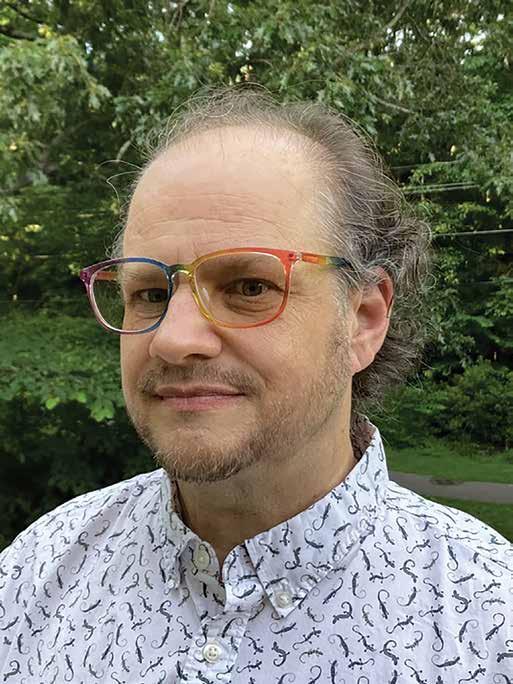
Working at the LGBTQ Center of Durham is a labor of love for our local culture and community—period.
I was invited to co-lead our planning committee back in 2021, and I felt led to accept the invitation because it aligned with my commitments to the arts, equity, and community engagement. It was also a clear chance to co-create liberated spaces for LGBTQ+ folks with LGBTQ+ folks.
Thankfully, as I've come to understand and affirm my identities, I have continued healing from a lot of self-hatred and come to appreciate how being Queer has shaped my ideas of living wholly for the better.
Now, I'm deeply committed to loving myself and to giving myself permission to show up whole. I hope that others are inspired and encouraged to do the same in ways that help us all embody liberation and justice more fully, and I hope that these ideas and intentions transfer well into the collective experiences and outcomes of our programs for Pride: Durham, NC.
Here's to making spaces that make us proud to be who we are without apology and proud to be in Durham!
Hunter
(THEY/THEM)
HEALTH CASE MANAGER
I have a passion for dismantling privileges by creating equitable spaces that reduce barriers to access to health and wellness across the spectrum. My background is in psychology and public health, and I've always known that I wanted to work in spaces where I can advocate for my community. Working at the [LGBTQ] Center has allowed me to find my voice and help others to find theirs, too.
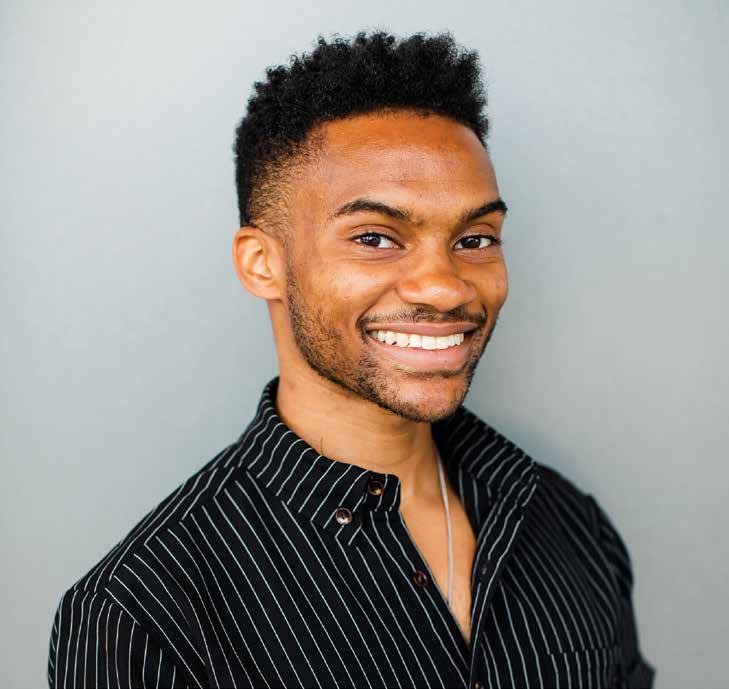
E Wright
(THEY/THEM)
LGBTQ+ SURVIVOR SERVICES COORDINATOR
I serve as an advocate for Queer and Trans survivors of intimate partner violence, sexual assault, and family violence. We do things like provide support, legal advocacy, education, and resources directly to LGBTQ+ community members in need. We also support existing agencies to strengthen their capacities to better serve survivors in all marginalized identities.
This project was initially brought to the LGBTQ Center of Durham as the NC LGBTQ Domestic Violence Response Initative and was hosted by a cishet institution. Something to celebrate from 2023 is the reclamation of
the project under the LGBTQ Center of Durham and the birth of the Southern Queer Survivor Network!
SQSN (pronounced "squizzin") aims to partner with coalitions, affirming agencies, and pockets of communities throughout the state that want to make the world better for Queer and Trans survivors—across all of North Carolina, not just here in the Triangle. It's a really stellar program, very word of mouth, so we're very relational.
So, yeah, this is incredibly meaningful work for me.
I am white, fat, Queer, nonbinary, and a survivor of abuse. I have never worked in such a place that has been so affirming of my whole self. It's truly for us, by us. My identities are so deeply connected to what gives me pride, purpose, and conviction for this work.
As difficult as this job can be, in this political climate with a constant attack on our identities, with what little financial resources we have, a major part that sustains me is the profound connection I share with my beautiful coworkers, my community, and how we impact each other. It's why we've chosen a mushroom for our logo—well, it's really about the mycelium. If you know, you know. It's our way of persisting.
20 September 20, 2023 INDYweek.com
Alix Adrian PHOTO COURTESY OF THE SUBJECT
Jesse Huddleston
PHOTO BY MORGAN CRUTCHFIELD
Alix Adrian
(HE/HIM/THEY/THEM)
OPERATIONS MANAGER
In early 2016, when I walked through the door of the LGBTQ Center of Durham for the first time, I was my kids' mom looking for support for me and looking to support other parents of Trans kids. I was not disappointed. I also didn't know I was Queer. And I didn't know how much I needed this home to become who I am today.
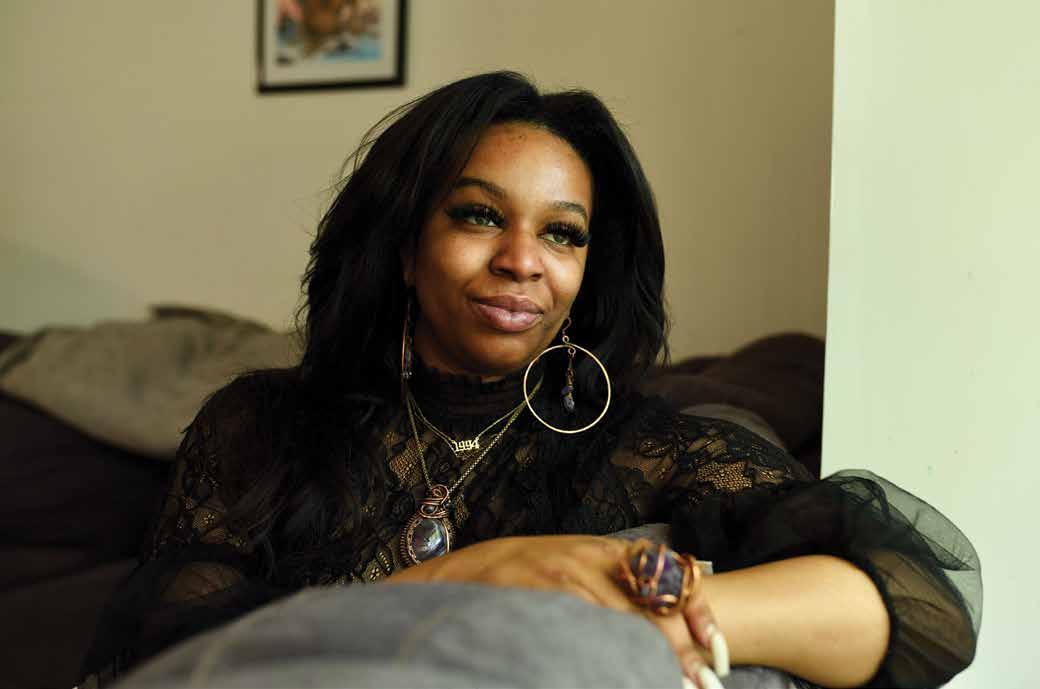
Currently, I am operations manager, and this summer was my third anniversary of being a full-time employee at the center. I still support families with Transgender and gender-diverse kids of all ages, across North Carolina, and like the best work done here, this includes helping folks gain the confidence, knowledge, and skills to advocate for themselves, their families, and their community.
I hold in my heart that this center was intentionally ignited from a community survey and community members' hard work, hard play, and deep love. The all-volunteer leadership created a structure and an invitation for folks to create the programming they were seeking.
Thoughtfully, with significant grant funding, we have been
Portraits of Pride
able to add social services to the center that are designed to uplift the most marginalized among us—Trans and Queer people of color. Our programs provide spaces for self-discovery. And this brings reward to our clients and ourselves. Some of the greatest joys of my job are found when I can observe a Giving Closet shopper step out of their cis disguise into clothing that expresses their authentic self, and when Name Change Navigation clients stop by to show me their life-changing ID with an affirmed name and gender marker.
We recently moved to a new space (that puts a lot on the operations manager's to-do list!). As we settle in, I am reminded about how fluid our organization is and how much we still need our community to contribute to be successful. I could not have orchestrated this move without my team of tireless volunteers. Equally important are donors who provide financial support, especially on a recurring basis, to help cover the expense of keeping the lights on and the supply cabinet stocked.
Whether it's rearranging furnishings, completing the programming and volunteer coverage calendars, or sharing the new legislation's restrictive practices for schools with parents, all the work I do here is transformative. I wouldn't have it any other way.
Vanity Deterville (SHE/HER/HERS)
DIRECTOR OF GENDER ADVOCACY AND SUPPORT
As a Black Transgender woman born and raised in the South, I embody the resistance against the narrative that Southern infrastructure, politics, and sentiment paint about Queer and Trans people around the world.
I didn't have many Black Trans role models growing up in Charleston, South Carolina, and as a result, much of the success in my life and transition was through trial and error. For Trans folks, especially those of color, the error in our trials can render fatal results if we lack support systems.
I met the staff of the LGBTQ Center in 2019 at a conference on youth homelessness and, after all speaking passionately about our hopes for the youth as it pertained to our lived experiences, we determined our values aligned and I was welcomed into the team in 2020.
What I appreciate most about being LGBTQ is that oftentimes our personal and professional lives are married together and we are fully invested in seeing each other usher our lives from surviving to thriving.
INDYweek.com September 20, 2023 21
Vanity Deterville PHOTO COURTESY OF THE SUBJECT





22 September 20, 2023 INDYweek.com WHEREVER YOU ARE WHOEVER YOU ARE, YOU ARE ON LIFE’S JOURNEY, WELCOME HERE. Learn More at PilgrimUCC-Durham.org

INDYweek.com September 20, 2023 23

24 September 20, 2023 INDYweek.com

INDYweek.com September 20, 2023 25

26 September 20, 2023 INDYweek.com




INDYweek.com September 20, 2023 27
My purpose in working at this center and in the greater Durham and Triangle community is to restore and strengthen the relationship our organization has with Black and Brown Queer folk and seeing the hope in faces and experiences similar to my own is what keeps me driven in the work.

Shaye Loyd

(THEY/THEM/THEIRS)
CASE MANAGER FOR THE SOUTHERN QUEER SURVIVOR NETWORK
I do this work to ensure that Queer and Trans survivors can build up their support networks and get access to necessary resources in their area. I feel drawn to do this work as a Queer survivor to support my community in ways that I wish I would have been supported.
What I appreciate most about being Queer is the community. I especially have found a deep appreciation for the community here in Durham; I feel safe and surrounded by Queerness.
Freddy Perkins
(HE/HIM)
YOUTH CENTER CO-DIRECTOR
My role has been and will always be to create sustainable programming that meets the needs of today’s Queer youth and encourages them to step into their power as leaders within the community.
During the height of the pandemic, while carving out the vision for the Youth Center, I worked to create programs to fill in the social gaps created by the COVID-19 virus. Now, post-pandemic, the Youth Center is implementing programs that address social wellness and expand into other areas of health.
Before working at the center, I worked as a board-certified music therapist, serving the LGBTQ community and other diverse communities. In my clinical work, it quickly became apparent to me the lack of access to services available for Queer people of color and Queer youth of color. This discovery pushed me to want to create those resources. Luckily, the opportunity to build the Youth Center arose, and I jumped at the chance to work with such an eclectic group of individuals who all want to see Queer people thrive in the world.
What I appreciate about being a Queer person is the reminder it gives me not to limit myself. As a cisgender Black man, the world has a lot of thoughts and opinions about who they expect me to be. My Queerness reminds me that I’m multifaceted and capable of existing in whatever way best represents me. My identity may have labels,

but that does not mean those labels are fixed. I’m free to ebb and flow unapologetically and redefine what Black maleness looks like—how it speaks, dresses, behaves, and travels throughout space.
The youth I interact with daily also serve as an example of the aforementioned reminders. To see them live authentically in their truths and remain open to the idea that they are in a constant state of getting to know themselves is inspiring to me. Seeing them and being able to travel alongside them in their journey is what keeps me coming back to this work and advocating for systemic change.
Gemynii Gatcombe
(SHE/HER/HERS, THEY/THEM)
DIRECTOR
OF HOUSING & THERAPY SERVICES AND MULTIDISCIPLINARY ARTIST
What I appreciate the most about the LGBTQ community is our ability to continue to shine even when the world works to diminish our light. We make a way to be seen, heard, and felt. We make a way to create our own opportunities and families. We make a way out of no way, and I love the resilience of our people. It is that same resilience that continues to motivate me on a daily basis from what I do at the LGBTQ Center, my artwork, and what I do on the dance floor as a DJ and party curator.
28 September 20, 2023 INDYweek.com
"Faces of Black Queerness" ORIGINAL ARWORK BY GEMYNII GATCOMBE
Niccolo Roditti
IN MASCULINE FORM (HE/HIM THEY/THEM)
CO-DIRECTOR OF LGBTQ YOUTH CENTER
Kali Fuchis
IN FEMININE FORM (SHE/THEY)
I was born in Guayaquil, Ecuador, and immigrated to the United States with my mother at the age of three. From an early age I grew up surrounded by matriarchs and feminine energy. It was clear to me that my perception of life was different. My family taught me that community, in this case biological family, is the most important thing to create experiences that make you and others feel happy and whole.

Growing up in Rhode Island among poverty and moving to North Carolina at the age of 11, I had a strong base for community education from my family and CVS Highlander School, where I received a liberatory education centered on the principles of equality and well-being for everyone. I truly believe that these fundamental values and teach-
Portraits of Pride
ing led me down a path seeking answers for: What causes communities to fail and experience challenges? How can communities thrive and under what circumstances?
I went on to obtain a bachelor's degree in psychology and international studies from NC State University; go Pack! After college, I found myself working for numerous community organizations in Durham such as Families Moving Forward, Student U, Book Harvest, and Witness for Peace Southeast. In each community position I learned that systems cannot change without communities and individuals developing skills that allow individuals to reflect, learn how to critically think, and understand a sense of self. In the midst of working within communities, I found my own Queer family in a group of drag performers.
I found safety in failing, challenges, setbacks, because I had a community that affirmed I was more than moments of distress or uncomfortability. I was able to vocalize fears and was validated. Eventually, I started to realize that many of the fears and anxieties that I picked up throughout environments were because those spaces (work, social, and familial spaces) did not recognize or lacked the experience to understand my full identities as
a Queer Latine person.


My drag name is Kali Fuchis. Kali Fuchis is Niccolo and Niccolo is Kali. I tapped into a divine feminine spirit (with an incredible eye for fashionable shoes) and recognized even within nightlife and social events there's a need for positive experiences that connect Queer community members together. My personal need for spaces like this and developing a sense of self hugely benefited my community organizing work and how I show up to advocate for myself and as representation for Queer communities I align myself with. Yes, I wear cute 1990s Latina outfits with elaborate eyeshadow looks and perfectly applied lipstick, but as a bearded drag artist I have a larger message. I learned that much of my internal conflict and gender dysphoria was lacking the language to explain to people that there was a duality I felt internally between my masculine and feminine presence.
I would not have been able to begin to dissect this notion if not for drag and my drag family. It was the experiences I had with them surrounding the art of drag that gave me the holistic support to fully understand myself. I knew how hard it was to find community and felt maybe that is what others are struggling with as well.
INDYweek.com September 20, 2023 29
L to R: Niccolo as a child with family, Niccolo Roditti, Kali Fuchis IMAGES COURTESY OF THE SUBJECT
Intentional communities built on shared interests, trust, and genuine want to see others succeed. However, many systems in place by local, state, and national systems of government and commerce prioritize individuals as agents of change for “good business,” not necessarily mutuality or community connection.
The main priority, whether it is intentional or due to power constraints, is profit and “good business,” for those with power. The problem is that education and experiences for positive personal development that leads to thriving communities is not the main focus of the government, and unfortunately due to systemic constraints and funding, it is also not the main focus of many community organizations. Queer Trans youth in particular are hyperfocused on as a problem to distract from an overall lack of opportunities for all individuals. Globally, the way we live is threatening opportunities to develop a sense of self and abilities to live a thriving life.
I joined the LGBTQ Center of Durham's staff last August after completing a master of education in community development and action at Vanderbilt University in Nashville, Tennessee. I applied my experiences in community work and my own personal gender identity journey to intentional programming for Queer youth in Durham. I am passionate about creating spaces for all individuals to have opportunities to experience positive human development. For example, we are starting paid support groups for transitional-age youth, ages 18–24, created by project fellows of the same age funded by the City of Durham’s Office on Youth.
We needed to be innovative with our programming at the LGBTQ Youth Center of Durham in order to uncover what really are the answers for change.
This being Durham Pride Month, it is important to note that not one person has these answers, but the solution is in community and experiences that tell a person that being vulnerable, learning through discomfort, active listening, and self-accountability are tools that prepare you to be present and experience joy, while inviting experiences that may lead to conflict and change.
The LGBTQ Center of Durham staff and Pride Committee have created an atmosphere where these experiences are within reach for the Queer community of Durham and the Triangle.
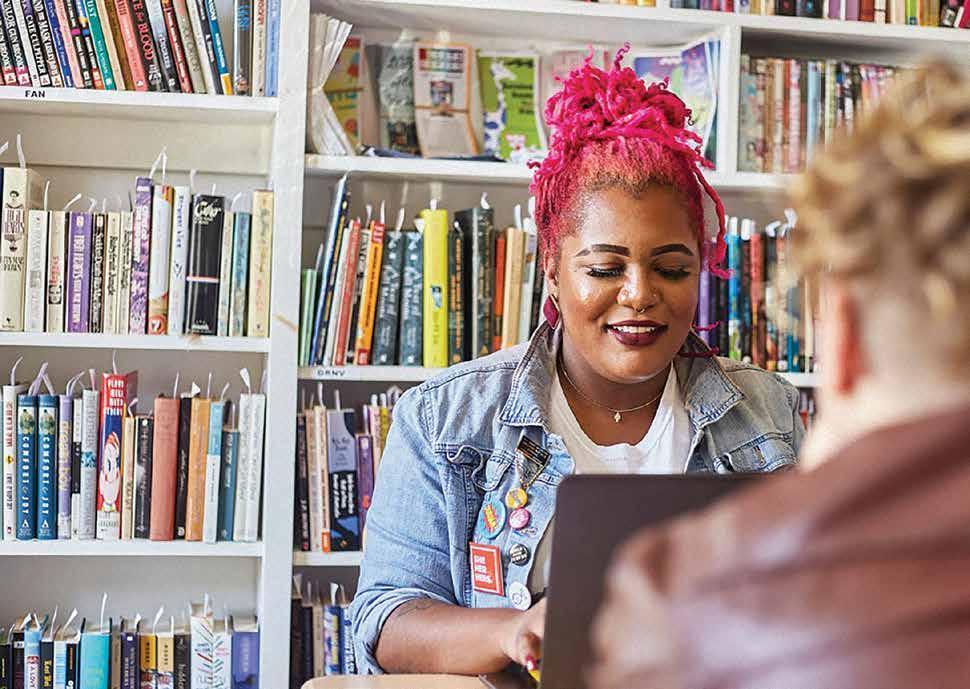
Pride is to recognize the wholeness of a person, and that is an essential part of systems change.
Raye Dooley
(THEY/THEM/THEIRS)
SOUTHERN QUEER SURVIVOR NETWORK (SQSN) DIRECTOR
I'm a Trans social worker and public health nerd from the South and direct the Southern Queer Survivor Network (SQSN), a project at the LGBTQ Center of Durham that provides statewide services to Queer and Trans North Carolinians who have experienced

relationship harm.
I first started working in domestic violence (DV) response in 2009, shortly after DV seriously impacted a close loved one. Over the course of my work in DV response and prevention, I have become too familiar with the ways traditional services fail Queer and Trans people.
Queer and Trans people as a whole, and especially those of us who have survived violence, deserve to be met with dignity, care, and competence. SQSN proudly strives to provide by-us, for-us anti-violence services that were built with Queer and Trans people in mind from the beginning, rather than ones that account for our communities as an afterthought.
I have called Durham home for 11 years, and I've been in North Carolina for almost 15 years. I am happily settling into middle-age domestic bliss here with my partner, toddler, dog, and cat.
The life I’ve built is something I'm really proud of. I didn't know any out gay adults as a young person growing up in Georgia, and it is important for me that younger Queer and Trans people have models for possibilities of all kinds of Queer life—both the fabulous and the ordinary.
Being an employee of the center means being a visible representative of Queer folks in Durham. I am particularly proud to bring my professional and personal identities and experiences to the center at a time when state and local governments are actively attacking Trans rights. Our existence is radical, and our belonging in community is beautiful! W
30 September 20, 2023 INDYweek.com
L to R: Case manager Amber Esters in September 2019 PHOTO BY JADE WILSON; HUGS IMAGE COURTESY OF LGBTQCENTEROFDURHAM.ORG




INDYweek.com September 20, 2023 31 BILL BURTON ATTORNEY AT LAW Uncontested Divorce Music Business Law Incorporation/LLC/ Partnership Wills Collections 967-6159 SEPARATION AGREEMENTS UNCONTESTED DIVORCE MUSIC BUSINESS LAW INCORPORATION/LLC WILLS (919) 967-6159 bill.burton.lawyer@gmail.com
The Most Rainbow Fish
Despite obstacles ranging from the Hollywood strike and rainbow capitalism to North Carolina’s new anti-LGBTQ laws, producer, casting director, and entrepreneur Beverly Tan is out and proud in what sometimes feels like a small pond.
BY JASMINE GALLUP jgallup@indyweek.com
With her rainbow-colored hair, sparkly eye makeup, and iridescent nails, Beverly Tan is immediately recognizable. The 30-year-old lesbian shines with self-assurance, exuding queerness even in a run-of-themill coffee shop.

“I’m a wannabe lesbian icon,” Tan says with a bright smile. “I’ll be the most rainbow fish in the small pond.”
In many ways, Tan is just being herself. She loves sparkle, she loves lavender, and she loves to stand out. But in North Carolina, a queer person being themself is inevitably a statement.
“I’ll have younger queers say, ‘Wow, you’re so out there. You just look gay,’” Tan says. “There are kids out there that want to be that, but they’re scared. It is hard, especially with the recent laws here in North Carolina. I don’t think everyone has to be brave, but I am. And hopefully that can be a little bit of hope.”
Even in the liberal Triangle, Tan’s appearance has sparked backlash, she says. People on the street and online take issue with her identity and LGBTQ-focused activism, sending hate mail and berating her at community events. But Tan hasn’t let that affect her.
“Someone’s gotta do it,” she says, whether that’s protesting North Carolina lawmakers writing bigoted bills or casting queer people of color in reality TV shows. Tan just happens to be in a position where she can step up to the plate.
“I do a lot of activism. Whenever there’s a cause … I’m at the [General Assembly], I’m driving people to polls,” she says.
“I grew up as an evangelical Christian, so I grew up doing a lot of activism on the other side of the fence. [Today] I have the physical ability, the charisma … and, when I’m employed, the money to do something good for my community. So I’m going to do it. Like your friendly neighborhood Spider-Man.”
The road to Hollywood
Tan, who attended high school and college in North Carolina, now spends about half her time here and half in Los Angeles. She first went to Hollywood in her midtwenties to pursue her dream of becoming a filmmaker, moving across the country on only three days’ notice. With persistence, she’s become one of the rare success stories.
When most of Hollywood isn’t on strike, Tan works as a development producer and casting director. In the white, male-dominated industry, she tries to create space for women, people of color, and members of the LGBTQ community. Growing up, Tan didn’t see many people who “looked or lived like me” on TV, she says—there weren’t many Asian or queer people in starring roles.
“So I thought, ‘I could fix that,’” Tan says. “We can protest, we can be actors, we can audition, we can write all day long … or I could be a casting director in big Hollywood. Become the gatekeeper, and blow those gates open for my communities.”
When Tan casts roles, “option A is a person of color. Option B is a person of color. Option C is a person of color,” she says. “What are they gonna say, ‘Where’s the white person?’”
Sapphic space
When Hollywood abruptly shut down about three months ago due to simultaneous writers’ and actors’ strikes, Tan found herself at loose ends. Unemployed, she had enough money saved up to survive for a year or two but nothing to do.
32 September 20, 2023 INDYweek.com N E W S The Triangle
Entrepreneur Beverly Tan
PHOTO BY ANGELICA EDWARDS
Tan had already started one business—a 3-D printing shop—so maybe it’s not surprising that her newfound free time prompted her to start another one. Sapphic Space, a queer gift shop, originated because of Tan’s frustration at not being able to find lesbian-focused products in LGBTQ-owned businesses.
“I go to these queer-owned gift shops … but they’re all just very gay-male-oriented,” she says. “Which is great for them, but I’m a lesbian. You can’t even find the lesbian flag in half of these [stores], and I don’t think it’s because they’re sold out. So I thought to myself, like, ‘Hey, how can I fix this?’”
The actual decision came during a night of drinking, Tan confesses.
“I drank a lot of wine,” she says with a laugh. “When I drink, I don’t get hangovers. I open businesses. Like, martinis make me smarter.”
Tan’s products range from innocuously rainbow to “spicy,” she says. Her safe-forwork products include T-shirts and stickers with cute, pro-queer messages like “#Gaysian,” and “I think you’re pretty (in a gay way).” For the bolder customers, there are also clitoris-shaped earrings and a coathook in the shape of Tan’s fingers in a recognizably sexual position.

“It brings me great joy knowing that there are lesbians in the world that have my hand on their wall,” Tan says.
Anti-capitalism, pro-community

Tan mostly sells her merchandise through online stores like Etsy, although she’s also
opened pop-up shops around the Triangle. Tan wants to encourage people to support queer-owned businesses like hers rather than big-box stores, she says.
“If you look online for lesbian merch, it’s Amazon. It’s not made by actual lesbians. It’s just some mass-produced drop-shipping. There’s no heart in it,” Tan says.
“It’s time that we go fight rainbow capitalism. There’s all these companies where, in June, it’s rainbows, gays! Then July 1 rolls around and they stop donating money. They stop doing anything. Target, at the first sign of complaints, pulled stock off the shelves. They’re not actual allies.”
In the coming weeks, Tan plans to open a maker space for minority artists above her workshop on Glenwood Avenue, with discounts for the most marginalized communities. Although she’s no financial guru, Tan says she also hopes to teach aspiring entrepreneurs how to make smart investments and manage budgets.
“It’s really important to me, because there’s a lot of wealth disparity in the queer community,” Tan says. “You either have a very privileged group of people or people who are struggling through no fault of their own. Like, getting kicked out at a young age … or having a hard time finding employment.”
Tan wants to create a space where art, technology, and community can intersect, she says. And, of course, where she can also make “really dumb lesbian jokes.”
“It just makes me so happy when I see other people really being themselves,” Tan says. “Existence is an act of rebellion in some places. I exist.” W
INDYweek.com September 20, 2023 33
A sticker from Tan’s gift shop Sapphic Space
PHOTO BY ANGELICA EDWARDS
MIPSO + VIV & RILEY
Thursday, September 21 | 8 pm | Cat’s Cradle, Carrboro
Growing Traditions
Viv & Riley’s new release, Imaginary People, riffs on pop and Americana, building on the Durham duo’s sparkling creative kinship.
 BY NICK MCGREGOR music@indyweek.com
BY NICK MCGREGOR music@indyweek.com
Traditional music runs in the blood of Vivian Leva and Riley Calcagno. Both were raised by parents immersed in old-time and bluegrass. Both mastered multiple acoustic instruments as children and started performing in their teens. Both spent summers riding the fiddlers’ convention and competition circuit.
But a funny thing happens with aging. Depending on nature and nurture, some folks’ blood runs thicker, thinner; colder, hotter. As we age, desires change, ambitions alter, and value systems shift.
Of course, “growing older” is all relative for Leva and Calcagno, both just 25 years old. Yet hard-earned wisdom abounds on their new album, Imaginary People, out September 15 on Free Dirt Records. It marks their first release under the Viv & Riley moniker, their first collaboration with producer Alex Bingham, and their first time intentionally breaking free from acoustic roots.
To start, the duo wrote songs on an electric guitar and drum set—no big deal for most, but borderline sacrilegious
for those who came up in reverential old-time scenes.
“It sounds trivial,” Calcagno tells the INDY over lunch at Gojo by Goorsha in Durham. “But using an electric guitar and drum set really changed the possibilities and spurred a more adventurous spirit going into our recording session with Al.”
That’s immediately evident on album opener and lead single “Kygers Hill,” Leva’s wistful rumination about returning to her old Virginia home. Yes, it references long rides through the Blue Ridge Mountains, but it does so atop a warbly, vibrato-drenched guitar lick from Calcagno.
“I wrote that song melodically and lyrically in its entirety,” she says, looking at her partner. “But you really shaped it—the guitar riff you came up with is so integral.”
That “you” is key to understanding the intense bond that Leva and Calcagno share. The two have been nearly inseparable since meeting as high school graduates in 2016 at the Festival of American Fiddle Tunes in Port Townsend, Washington. Throughout the INDY’s 90-minute conversation
with them, they communicated as much with each other as with their interviewer, sharing sly smiles and concentrated eye contact as they completed each other’s sentences.
That intimacy stands out on “Sauvie Island” and “How to Lose,” which start with solo verses before reverting to trademark interlocked harmonies on the choruses.
When they started recording with Bingham at his lakefront Bedtown Studios in Virginia, he teased them for cramming themselves into the tiniest spot available.
“It was hilarious,” Bingham remembers, clarifying that his studio is not big “by any means.” But, he says, the pair made their way to “the farthest back corner. It cracked me up.”
Calcagno concurs: “Al thought we were freaks.”
Belying that intense intimacy, Imaginary People also rises above what Calcagno calls the “interpersonal drama” that dominated the duo’s earlier work. “Sauvie Island” hearkens back melancholically to Portland, Oregon, where Calcagno moved after graduating from Oberlin College in Ohio as Leva finished her education at Lewis & Clark College. She graduated in December 2020 at the height of the pandemic.
“It was also the year that the wildfires were really awful,” Leva says. “Things felt truly apocalyptic. But we were making meals and mulled wine together, going down to this beach on the Columbia River, and trying to find beauty amidst the hardness of it all.”
Meanwhile, “Is It All Over” is a sardonic study in paradoxes. The song combines gentle, blissed-out instrumentation and MPC loops with lyrics that drag billionaires wanting to blast off into space while the planet burns.
“It’s this idea of pushing the capitalist game as far as it can go,” Calcagno says. “The UN puts out this really dark climate report about environmental degradation, but we’re still open for business.”
Then there’s “The General,” a freewheeling rock ’n’ roll song built around Leva’s sharp couplets (“Why’d you even have to come downstairs? / The way you look at me makes me scared”). “After I wrote that, I remember us saying, ‘Dang, we’re going to need to start a new rock band so we can perform this song!’” Calcagno laughs. “It just felt like a totally different version of us.”
The album’s title track, on the other hand, is an instant Americana earworm—easy to envision on the radio or soundtracking a film, with Leva’s intoxicating vocals recalling heroes like Iris DeMent or Joni Mitchell. Writ-
34 September 20, 2023 INDYweek.com M U S IC
Vivian Leva and Riley Calcagno
PHOTO BY LIBBY RODENBOUGH
ten by Leva, “Imaginary People” is about realizing “you can’t count on someone else for your own happiness,” she says. “It’s up to you to know yourself and come to terms with the fact that you’re in a moment of growth or change.”
“Flashing Lights,” meanwhile, relates a joyful moment from late 2021 when Viv & Riley traveled to Nashville to play Americana Fest and spent a blissful night dancing with friends.
“It was a beautiful experience to feel youthful again,” Leva says. Calcagno references his earlier comment: “We used to write songs to each other that were complicated and fraught,” he says. “But ‘Flashing Lights’ is about one of those collective experiences we processed together, which is a much healthier and sweeter process.”
Still, their early days as a duo are baked into their beings. For their first tour together, in 2018, they dropped out of college to play a month of house shows in Manitoba, Saskatchewan, and Alberta—in March.
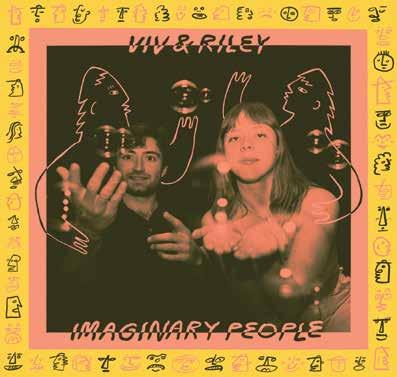
“It launched us into taking things seriously,” Leva says. “That was very important for the start of our duo.”
Leva’s first solo album came out while they were in Olds, a Grasslands town of 9,000 in Alberta.

“We both were so proud of it,” Calcagno says, “but we were playing a house concert to five people during a blizzard that all the Canadians said we would die in if we tried to drive the next day.”

Imaginary People ends on “The Blackest Crow,” a Civil War–era Appalachian ballad that’s been a staple of live sets for both Viv & Riley and their traditional string band, The Onlies. With Bingham’s guidance, though, they approached this version differently.
“Al took it to a new place,” Leva says. “That was our challenge: How do we reimagine these songs so that they’re unlike anything we’ve ever done before? There are background loops of Sam [Fribush] and I clinking ice and water glasses, along with guitar sounds and organelle from Andy Stack. When we play it live, we’ll still do
it with just banjo and our two voices. But it’s really nice to have this recorded version that’s so different.”
That ethos perfectly encapsulates Viv & Riley’s here and now: mindful of their past while looking eagerly into their future.
“More than ever, we’re operating as a unit—a single entity—which is exciting,” Calcagno says. “We have confidence in ourselves as collaborators and faith in our partnership.”

Of course, anyone who’s pursued a professional path with their romantic partner knows how fraught that journey can be, so the pair continue to cultivate their bond as a couple. At home, they play the board game Wingspan and love to cook together.



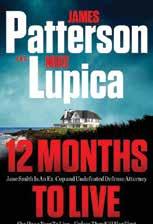


“We have not always been able to cook together,” Leva deadpans. Calcagno goes further: “That’s been a huge area of growth for us. I used to really annoy Viv when we were cooking, and now she’s learned to tolerate me.”
Bingham marvels at Viv & Riley’s maturity. “They were only 24 years old when we recorded Imaginary People together, which was shocking to me,” he says. “They’re very close friends, they anticipate each other’s needs and have a really beautiful balance as a couple and as a duo.”
Bingham also emphasizes the fact that Viv & Riley purposely pushed their music in new directions—all without pushing their old audience away.

“This record feels like a very natural transition for us,” Leva says. “We’re building a new identity. We’re creating new things that can still be a part of that Americana tradition. It’s been so inspiring to see these new themes emerge in our work and make connections with people like Alex who are helping us tell our story in a new way.”
Leva and Calcagno lock eyes again, sharing another long look.
“Getting older is not a linear thing,” she says. “We were teenagers when we met, and now we’re adults, but growing up is a messy path. You have to give yourself the flexibility to ebb and flow. We’re changing. And we’re excited to share that with the world.” W
INDYweek.com September 20, 2023 35 Raleigh's Community Bookstore Get tickets to these events and others at www.quailridgebooks.com EVENTS www.quailridgebooks.com 919.828.1588 • North Hills 4209-100 Lassiter Mill Road, Raleigh, NC 27609 FREE Media Mail shipping on U.S. orders over $50 IN-STORE IN-STORE IN-STORE TUE 9.26 7:00 PM TUE 10.3 7:00 PM THU 9.28 7:00 PM
Christmas IN-STORE
Mary Kay Andrews, Bright Lights, Big
James Patterson & Mike Lupica, 12 Months to Live
MEREDITH COLLEGE JONES CHAPEL
IN-STORE
Sandra Gutierrez, Latinísimo
*Tickets required Wka e up withus Local news, events and more— in your inbox every weekday morning Sign up: INDY DAILY SIGN UP FOR THE
James Patterson & Mike Lupica, 12 Months to Live
MIPSO: BOOK OF FOOLS
Released August 25; One RPM
Up on the Downbeat
A decade into playing together, the harsh realities of touring almost made Mipso decide it was time to call it. Then came the new album.
BY SPENCER GRIFFITH music@indyweek.com
“We got our ass kicked.”
In June 2022, more than a decade after forming Mipso, the North Carolina quartet was touring through Europe to support their adventurous self-titled album when, according to mandolin player Jacob Sharp, the aforementioned kicking began. Lost instruments, missing merchandise, food poisoning, bed bugs, and stolen personal belongings were just some of the woes that piled on during the COVID-stricken tour, which led to some frank mid-tour talks.
“There were some real reckoning chats in the moment of like, ‘Does this make sense?’” says Sharp, remembering one socially distanced conversation in Amsterdam’s Vondelpark, during a week that some of the group was dealing with COVID. “Not even just this tour but let’s zoom out— ‘Do we do it again?’”
The domestic tour for 2020’s Mipso had already shown
the band the elements of the touring model that were effectively broken, as they navigated an industry wreaked by the pandemic. Barely breaking even on tours, despite high attendance—including sold-out shows—has been particularly disheartening.
“My worst moments while on tour have been when everything else has made it so I can’t be purely in the moment playing music with my friends,” adds bassist Wood Robinson, commenting on that European tour.
Spurred by those conversations, Mipso took a fresh approach to their sixth album, Book of Fools, released in late August of this year. The band took full advantage of a nearly three-year gap since the release of their last album— the longest thus far between Mipso records—and finally allowed themselves time to stretch out both the development of new material and the recording process.
“Before we knew what the songs would be and where
we’d go sonically, we knew we wanted to change the process to be slower and to have more time—and specifically more time away from the road—that was involved with the writing and recording,” Sharp says of the album approach. Over a year and a half, the band’s deliberate process included a writing retreat in the North Carolina mountains, workshopping songs in Wisconsin, and—for the first time—tracking directly to tape with producer Shane Leonard in California.
Fiddler Libby Rodenbough recalls that the band has always lamented a lack of time to experiment on previous records, although she says that, once they started, they could’ve continued tinkering with Book of Fools’ 10 tracks for weeks longer.
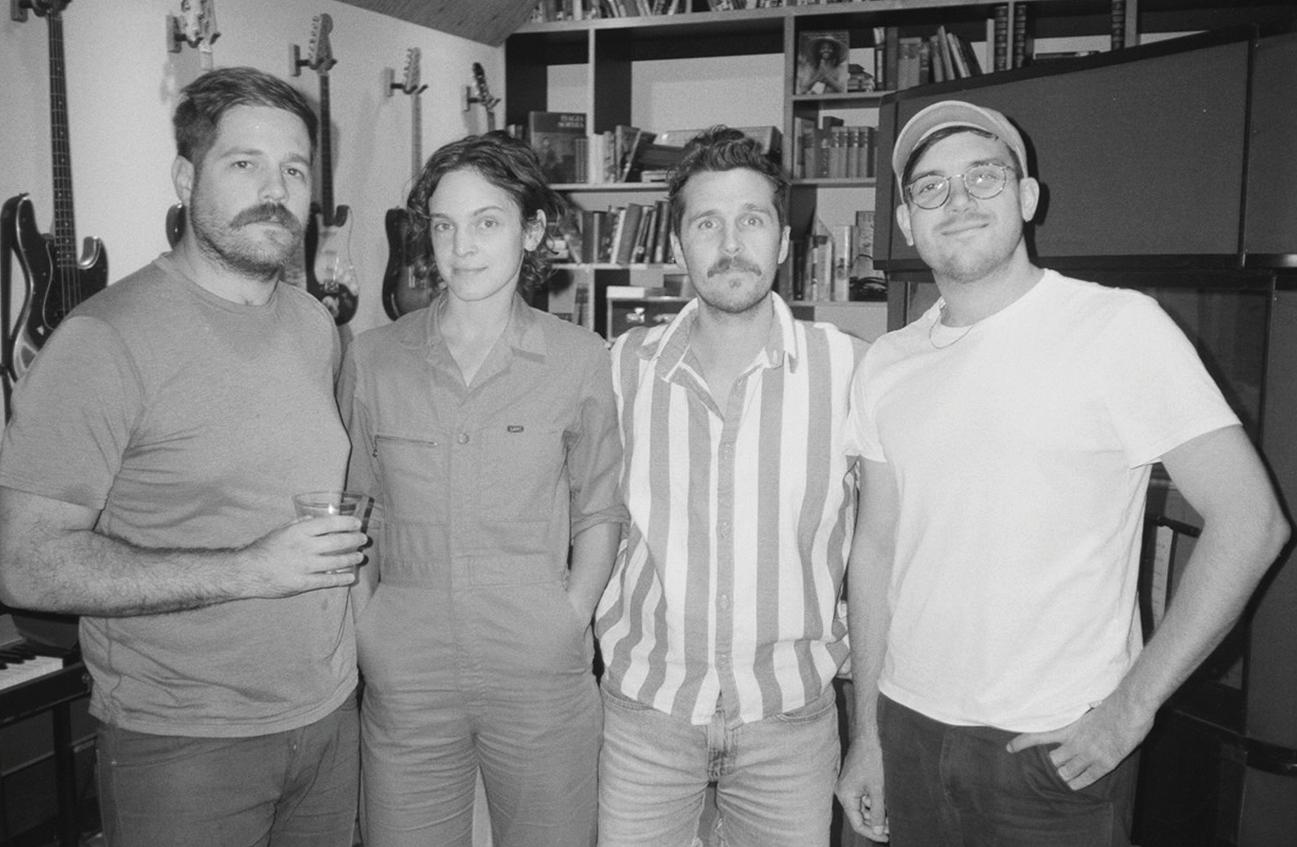
“I think that ‘wasting time,’ by the standards of our world, is probably where some of the best art is made,” she says. “It’s a real shame to think about how much isn’t getting made because of those parameters [of time and money].”
Many of the songs on Book of Fools went through dramatically different iterations before reaching their final form.
“I’m less surprised by which songs made the album and more by which version of a song made the album,” says Sharp, offering up, as an example, the moody and atmospheric “Break It to You Anyhow,” which evolved from stripped-down beginnings.
Lead single “Carolina Rolling By” wouldn’t sound too out of place on the quartet’s earlier records, though lap steel adds a decidedly cosmic touch. Despite the track evoking shades of previous material, Mipso’s members struggle to define their sound, as it has changed over the years—as Robinson sees it, they share no preconceived notion about how Mipso should sound. The synth-laden “Radio Hell”— which thumbs its nose at the exploitative nature of the music industry—stands in sharp contrast to what longtime listeners may have come to expect from the band.
“I think there’s less of a Mipso sound and more of a Mipso process,” offers guitarist Joseph Terrell, who swaps his acoustic for an electric far more often than on previous albums. “What we’ve found is that we like making records together, and the more we’ve done it, the better we’ve figured out the best version of combining these four voices. That might be a different formula and a different sound every time if we’re changing and growing as people.”
“Part of our story is that we were this happy accident,” adds Sharp of the group’s origins at UNC-Chapel Hill, where the four met as students. “We didn’t have a band that we conceptualized as fully formed, we just wanted to play music and wanted to do it with each other.”
This intentionality—choosing to make music together, as they’ve gone separate ways after college—is a defining
36 September 20, 2023 INDYweek.com M U S IC
Mipso members Wood Robinson, Libby Rodenbough, Joseph Terrell, and Jacob Sharp.
PHOTO BY GINGER FIERSTEIN
aspect of the band’s music. That doesn’t mean they plan to leave their past behind either, though, as they’ve batted around a return to acoustic string band instrumentation on a future album. (This past summer, they also recorded two songs at Amelia Meath and Nick Sanborn’s studio, Betty’s, in Chapel Hill.)
With Sharp releasing his first solo single—“Other Side,” a gentle piece of folkpop featuring harmonies from Aoife O’Donovan—and Terrell his debut album this year, all four members of the band also now have their own personal musical endeavors. Rodenbough’s second solo record, Between the Blades, was released in May, while Robinson leads experimental outfit The Other Band and the jazzy New Formal.
As Mipso operates in a democratic fashion, those outlets provide a home for songs that don’t end up resonating with the entire group. After being recorded and later cut for Coming Down the Mountain, “Colors” was transformed into a bright pop ditty on Rodenbough’s solo debut years later.
Those solo explorations, too, mean that each member has broader horizons when collaborating. At the suggestion of Leonard, the band revisited “East”—a song Rodenbough originally wrote for the podcast Song Confessional—for the album.
“At the risk of sounding overly earnest, this record-making process was kind of revelatory,” Terrell says. “We just let ourselves do stuff that we’ve never done before.”
Playing some of the biggest shows of their career on this tour—including favorite rooms they’ve never before headlined like Chicago’s Thalia Hall and San Francisco’s Great American Music Hall—the band seems reinvigorated with the new album in tow. They’ve also added pre-show acoustic performances to their routine, both in an effort to address the economic realities of touring in 2023 and in hopes of forging deeper personal connections with fans.
Rodenbough also says that the live tracking done while recording Book of Fools means that translating those songs to the stage will be more fun and exciting for them, as it keeps them on their toes.
“This new batch necessitates that we are very focused on exactly what’s happening at the time, which makes it a lot easier for everything else that’s going on to not end up clouding the moment,” agrees Robinson, alluding to the complexity of arrangements that requires the band to be aware of one another. “All of the kvetching that we do about the reality of touring and the fact that capitalism is sucking the ability to live when this is your livelihood—all of that just evaporates for me on the downbeat.” W

INDYweek.com September 20, 2023 37
Yield the Ghost
Kenneth Branagh’s latest Agatha Christie adaptation—his third, and best yet— explores Venice and existential dilemmas.
BY GLENN MCDONALD arts@indyweek.com


AHaunting in Venice , the latest in director Kenneth Branagh’s series of Agatha Christie adaptations, is not your typical Halloween horror film.

Set in postwar Europe, the film has no gore, no demons, no bloodied teenagers. Instead, we get crumbling Italian palazzos, fleeting apparitions, and some surprisingly sophisticated themes. It’s a Halloween movie for grown-ups.
The third and best installment in the series so far, the new film follows 2017’s Murder on the Orient Express and last year’s Death on the Nile. Once again, Branagh directs and stars as the natty Belgian detective Hercule Poirot.
But A Haunting in Venice brings us a different Poirot than we’ve seen before. World War II has devastated Europe. Our hero, disgusted with human folly, has retired from the sleuthing game and retreated to the calm waters of Venice. There’s a weariness about Monsieur Poirot. He’s seen the
soul of humankind, and he’s in despair.

Alas, Poirot is cajoled into One Last Mystery by his old friend, the famous crime novelist Ariadne Oliver (Tina Fey). A phony spiritualist (Michelle Yeoh) is exploiting those in grief by staging séances that seem to be real. “I’m the smartest person I’ve ever met, and I can’t figure it out, so I came to the second,” Ariadne tells Poirot.
The séance is held at the decaying palazzo of opera singer Rowena Drake (Kelly Reilly), desperate to contact her teenage daughter who died by suicide a year earlier, on All Hallows’ Eve. Or did she? The twists start right about here, so we’ll leave off with the details except to note that at least one additional death takes place at the séance. True to his technique—order and method!—Poirot cordons off the crime scene and forces everyone to spend the night in the derelict mansion.
All the familiar beats lock into groove. Poirot isolates each of his suspects and
grills them about the crime. With each interrogation we get another puzzle piece. This is the same essential game that Christie plays in her novels. By paying close attention to the disciplined disclosure of information, we are invited to solve the crime along with—or maybe even before— the great detective.
It’s impossible, of course, but it’s fun. And it’s all about the characters. Along with the psychic, the novelist, and the opera singer, we meet a twitchy doctor with PTSD; a spooky Slavic housekeeper with old-world superstitions; a pair of anxious Romani war orphans; and a preternaturally calm little boy.
Eventually we meet the ghost in question, kind of, which presents Poirot with an existential dilemma. As played by Branagh, Poirot is an atheist, a man of science; the ultimate rationalist. When he starts seeing ghosts, it doesn’t just rattle his nerves; it upends his entire philosophy. This is the most interesting part of the whole film, and I like that Branagh trusts his audience enough to include deeper themes of belief versus reason.
I like it even better that screenwriter Michael Green finds a way to resolve that tension while still providing an ending that plays fair by the rules of the classic whodunit. As one character notes: “We must make peace with our ghosts, whether real or not.”
A Haunting in Venice is professional-grade moviemaking, with top-shelf actors, artful design, and some gorgeous locations in Venice. It’s got a few good chills, but the really spooky stuff is buried just beneath the genre surface. Poirot’s dark night of the soul takes place in postwar Europe, but it speaks to a similar contemporary despair, too. If you see the movie, which I recommend, watch how the story ends. It’s a neat trick and a little ray of hope. W
38 September 20, 2023 INDYweek.com S C R E E N
A scene from A Haunting in Venice. PHOTO COURTESY OF 20TH CENTURY STUDIOS
A HAUNTING IN VENICE | HHHH Now playing in theaters



INDYweek.com September 20, 2023 39 LIMITED TIME OFFER $500 OFF * GET A FREE INSPECTION *Ten percent o any job over $2500 up to a max of $500. Coupon must be presented at time of inspection. O er may not be combined with any other o er. Limit one per customer. Ask inspector for further details. Promo valid through 9/30/2023. HIC#79336 BECAUSE YOUR CRAWL SPACE SMELLS REALLY MUSTY. REALLY 919-695-7310 FOUNDATION REPAIR BASEMENT WATERPROOFING CRAWL SPACE REPAIR CONCRETE LIFTING
ZELDA LOCKHART CELEBRATES TRINITY
Thursday, Sep. 21, 7 p.m. | Barnes & Noble at 5400 New Hope Commons Drive, Durham
Healing Words
BY
To prepare for her latest book launch party, Zelda Lockhart had all the regular party stress—snacks, invites, decorations—in addition to a team of contractors desperately trying to finish the classroom and stage Lockhart was building on her property.
“We’re trying to set things up, and the contractor is still screwing in the door,” Lockhart says. “The other contractor is screwing in the benches—it’s gonna be interesting.”
Lockhart, 58, moved from Hillsborough to Durham last year. In November, she began the process of converting her yard and the front third of her home into a workshop. Her Story Garden Studios, a space where Lockhart will lead workshops for Black women to heal through art and nature, will host its first meetings later this month.

In the workshops, Lockhart, who holds a PhD in expressive therapies and a master’s in literature, will guide women through writing exercises that help them process and heal from trauma.
This process is exactly how the author wrote her latest novel, Trinity Trinity follows three generations of a Black American family, from the late 1920s through today, as they fight to unravel the
pain of their past. A prologue outlines the initial traumatic event in their family, when an ancestor was kidnapped from Ghana and enslaved, but most of the action happens in the last 100 years, beginning with Benjamin Lee, a victim of child abuse who grows up in rural Mississippi. Due to his deep sense of abandonment, Bennie causes pain to most people in his life as an adult, especially once he returns from the Korean War. Bennie’s son, B.J., grows up with similar angst if less violence, though after serving in Vietnam he’s too consumed by the horrors he witnessed to offer his family the support they need.
Finally, there’s B.J.’s daughter, the Fayetteville-born Lottie Rebecca Lee—a special soul who has been trying to be born into the family for generations. Lottie Rebecca knows that the family needs to heal from the pain they’ve both suffered and perpetuated or they’ll stay stuck in these cycles. Using memories she retained from her spiritual existence before her birth, Lottie Rebecca drags her mother and uncles through their earliest colonial trauma in Ghana and back to Bennie’s childhood home. None of the characters are entirely sympathetic, but their pain and actions are all viscerally understandable and their eventual efforts to heal are deeply inspiring.
Lockhart, who began her PhD at 50, has been a DEI consultant since the 1990s. Combining deep trauma work (though Lockhart never used the word “trauma” in the two-plus hours we spoke) with art is a natural evolution of her background. Her first novel, Fifth Born, came out 20 years ago; Trinity is her fourth. Lockhart’s fiction has been a finalist for the Lambda Literary Award and the Zora Neale Hurston/Richard Wright Legacy Foundation’s award for debut fiction.
With her practice, Lockhart walks workshop students through a journey similar to the one Lottie Rebecca Lee leads for her family.
“Before you can make change in any other manner, whether it’s changing your multigenerational healing, your workplace, or your own family,” Lockhart says, “you have to put your hands on your own wounds.”
First, Lockhart has students identify an event in their past that’s still hurting or affecting their behavior in some way.
“We go up and down that line writing and becoming more aware, and it’s almost like waking up the spine,” Lockhart says.
For Lockhart that initial wound, she says, was abuse perpetrated by her father, who grew up in a home environment much like Bennie’s.
But Lockhart says workshop participants don’t remain in that place for too long. Once they’ve identified and begun sterilizing that trauma, she asks them to write about the perpetrator and what might have, in turn, wounded them. How can workshop participants empathize with this person without excusing their behavior? How can understanding that event help break the cycle?
“As you’re looking for how you are wounded, you have to also be in the process of having awareness of how not to then wound,” she says. For Lockhart, writing her way through her traumatic childhood led her to the character of Bennie and helped her listen to her own children more earnestly. And doing readings of her work around the country led Lockhart to both internal healing and cousins she’d never met.
Lockhart’s first workshop in the completed studio will be this week, a threeday weekend retreat full of writing and communal cooking.
“We’ll use art, nature, the garden, all of the things to make that sort of beautiful transition,” Lockhart says. The earliest exercises will help women connect their personal lives to “some of humanity’s wounds, which almost all are centered around our inhumanity to each other.” Lockhart draws most of those wounds back to colonization.
40 September 20, 2023 INDYweek.com PAG E
In her new novel, Zelda Lockhart’s characters have deep generational wounds. But—as in life–the work doesn’t stop there.
SHELBI POLK arts@indyweek.com
Zelda Lockhart PHOTO BY ANGELICA EDWARDS
“We’re all suffering in ways that so many people don’t know that they’re suffering,” Lockhart says. “Sometimes, people think, ‘OK, I’m not suffering. So let me help people who are suffering.’ And it’s like, no, boo, you are suffering, because of all of the behaviors that you are blind to in your own life and in your own lineage, and even in your daily things that you might want.”
That exploitation hurts Black women especially, but all of us are impacted.
“All of that is connected to colonization wounds, ways in which we have been industrialized and taught to believe that we have to financially succeed one over the head of the other,” Lockhart says. “These divisions have been created. There’s so much superiority lies just inundated in people’s everyday messaging.”
The relationship between Lockhart’s work and art is cyclical. As we tour her property, questions about the studio lead us to conversations about Trinity. Later, on the couch in the studio, asking questions about her book leads us to talking about her work. Digging into her personal trauma, developing a methodology for others to follow her on that journey, turning her home into a place to host that work—all of these are linked. She’s been opening up her space for communal gatherings since she lived in an apartment, and the house just didn’t feel right until she started the renovation work to turn it into a studio.
“Any place I’ve lived in my adult life, it’s just automatically been that I’ve been like, ‘You know what, we should throw this


thing and have poetry in the living room and music in the dining room,’” Lockhart says. “No space is too small to make some space.”
In the end, Lockhart’s home turned workshop space was finished just two hours before guests arrived for Trinity’s launch party. The screened-in classroom successfully kept the mosquitoes from the guests, and a procession of drummers and dancers led attendees to the stage before a DJ filled the party with music. Lockhart was thrilled to welcome guests into her finally completed home/studio and her story.
Before every reading she does, Lockhart asks her audience not to separate themselves from what they’re about to hear: Trinity is not a sad thing that happened to just one family.
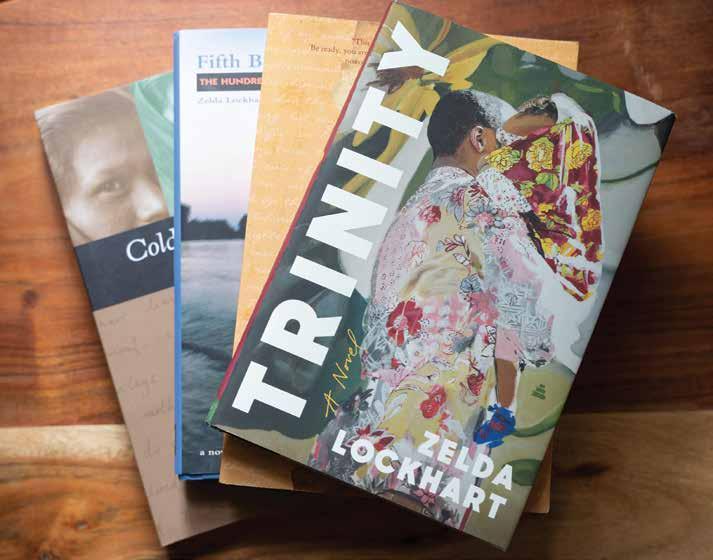
“By no means are you to sit here and be in conversation and think, ‘Oh, wow, that’s really sad what’s happening to that family,’” she says. Instead, she hopes her work inspires people to interrogate the trauma passed down through their own families.
In Trinity, it takes a uniquely equipped descendant to break the family’s cycles of violence, a girl who was almost born to Bennie’s mother, and then almost to his wife. But Lottie Rebecca Lee is special only in this story. In the real world?
“It’s not only Lottie Rebecca Lee who can pull out the truth, the bones, you know, the part of the stories that can help us heal the painful parts,” Lockhart says. “We can pull those bones up out of the mud. Any family member can do that. Anybody can do that.” W
INDYweek.com September 20, 2023 41
Books by Zelda Lockhart PHOTO BY ANGELICA EDWARDS
PRIDE DURH AM EVENTS
INDY Week Bar Crawl Fundraiser for PRIDE: Durham, NC $100. Wed, Sept. 20, 4 p.m. Queeny’s, Durham.
House of Coxx Homecoming Pride Drag Show Fri, Sept. 22, $15. 10 p.m. The Pinhook, Durham.
Pride on the Pitch with Stormy Daie $12. Fri, Sept. 22, 6:30 p.m. Bull McCabe’s Irish Pub, Durham.
CLUB ERA: Durham Pride Party with Naomi Dix $5. Sat, Sept. 23, 10 p.m. The Fruit, Durham.
The Conjure Pride Party! $10+. Sat, Sept. 23, 10 p.m. The Pinhook, Durham.
DOLLYWEIRD ART SHOW: OneNight Exhibition Celebrating Dolly and Durham Pride $15+. Sat, Sept. 23, 7 p.m. PS37, Durham.
Durham Pride Parade and Festival Sat, Sept. 23, 10:30 a.m. Duke University’s East Campus, Durham.
Pride: Durham NC Concert Sat, Sept. 23, 5 p.m. CCB Plaza, Durham.
HOUSE OF HER: All-Girls Pride Party Fri, Sept. 29, 10 p.m. The Fruit, Durham.
THURS 9/21
MUSIC
Ben Folds: What Matters
Most Tour $46+. 7:30 p.m. DPAC, Durham.

Bull City Summit $15+. Sept. 18-24, various times. Various downtown locations, Durham.
Corinne Bailey Rae: Black Rainbows Tour $33+. 8 p.m. The Carolina Theatre, Durham.
Everclear / The Ataris $36+. 7 p.m. The Ritz, Raleigh.
Islands $18. 8 p.m. Cat’s Cradle Back Room, Carrboro.
Joy Oladokun: Living Proof Tour SOLD OUT. 8 p.m. Cat’s Cradle, Carrboro.
The Lemonheads: Come On Feel the Lemonheads 30th Anniversary $30. 8 p.m. Haw River Ballroom, Saxapahaw.
Orbiting Human Circus (Duo) 8 p.m. The Pinhook, Durham.
The Philadelphia Orchestra $74+. Sept. 20-21, 7:30 p.m. Memorial Hall, Chapel Hill.
STAGE
A Piece of My Heart $25. Sept. 14-24, various times. Firebox Theatre Company, Wake Forest.
Carolina Ballet: Firebird $51+. Sept. 14–Oct. 1, various times. Martin Marietta Center for the Performing Arts, Raleigh.
Ma Rainey’s Black Bottom $33. Sept. 15-24, various times. Leggett Theatre, Raleigh.
MUSIC
Denver Massey 10 p.m. Tin Roof, Raleigh.
Jonathan Kreisberg Quartet $30. 8 p.m. Sharp 9 Gallery, Durham.
Leela James $15+. 8 p.m. The Carolina Theatre, Durham.
Live Jazz with Marc Puricelli and Friends Thursdays at 7 p.m. Imbibe, Chapel Hill.
Lord Jah-Monte Ogbon / Austin Royale $10. 9 p.m. Rubies on Five Points, Durham.
Mipso SOLD OUT. 8 p.m. Cat’s Cradle, Carrboro.
Nick Cave: Live in North America Solo $40+. 8 p.m. DPAC, Durham.
STAGE
The Minority Report: The “Minority Spies” Episode $8. 8 p.m. ComedyWorx, Raleigh.
PAGE
Halle Hill: Good Women
6:30 p.m. Letters Bookshop, Durham.
Jane Ferguson: No Ordinary Assignment 7 p.m. FedEx Global Education Center, Chapel Hill.
ART
Artist Talk: Amalia Pica 6 p.m. Ackland Art Museum, Chapel Hill.
Artist Talk: Susan Harbage 6 p.m. Gregg Museum of Art & Design, Raleigh.
SCREEN
Brother Outsider: The Life of Bayard Rustin 6 p.m. Nasher Museum of Art, Durham.
Documentary Film
Screening: Burned— Protecting the Protectors 7 p.m. D. H. Hill Jr. Library, Raleigh.
Movie Loft Presents Nénette et Boni 7:30 p.m. Shadowbox Studio, Durham.
42 September 20, 2023 INDYweek.com
TO
LIKE
PLAN AHEAD? WED 9/20
Futurebirds perform at Lincoln Theatre on September 22 and 23.
PHOTO COURTESY OF LINCOLN THEATRE
C U LT U R E CA L E N DA R
MUSIC
Chris Botti $15+. 8 p.m. The Carolina Theatre, Durham.
DJ KJB on the Rooftop Sept. 22, 29, and 30, 9 p.m. Tin Roof, Raleigh.
Futurebirds $33. Sept. 22-23, 8 p.m. Lincoln Theatre, Raleigh.
Hatchback 6:30 p.m. Tin Roof, Raleigh.
Mac Ayres $25. 7 p.m. The Ritz, Raleigh.
Megayacht / Hypnic Jerks
7 p.m. Huron Stage Music Venue, Durham.
of Montreal $18. 8 p.m. Cat’s Cradle, Carrboro.
Opening Weekend:
Tchaikovsky Symphony No. 4 $52+. Sept. 22-23, 8 p.m.
Martin Marietta Center for the Performing Arts, Raleigh.
Shreya Ghoshal: All Hearts Tour 2023 $158+. 8 p.m.
Martin Marietta Center for the Performing Arts, Raleigh.
Theatre Raleigh in Concert: Matthew Scott $35+. 8 p.m. Theatre Raleigh, Raleigh.
Tim Armacost Quintet $30. 8 p.m. Sharp 9 Gallery, Durham.
Violinist Jennifer Curtis and Pianist Jeanette Fang 8 p.m. Baldwin Auditorium, Durham.
Whitehall $15. 8 p.m. Cat’s Cradle Back Room, Carrboro.
STAGE
The Harry Show: An Improv Comedy Party $15. Fridays at 10 p.m. ComedyWorx, Raleigh.
Jo Koy $69+. Sept. 22-23, 8 p.m. DPAC, Durham.
Paperhand Puppet Intervention: Where Our Spirits Reside $20. Sept. 22-24, 7 p.m. NCMA, Raleigh.
SCREEN
J-Horror Film Series $12+. Sept. 22-24, various times. The Carolina Theatre, Durham.
MUSIC
Adulting: An Early Dance Party $10. 7 p.m. Rubies on Five Points, Durham.
Dan Davis Group 4 p.m. Durty Bull Brewing Company, Durham.
Future Residents: Gone Wild $5. 10 p.m. Rubies on Five Points, Durham.
HEATWAVE: A Summer Day Party Series $10. 5 p.m. PS37, Durham.
JULIA. / Late Notice / Galloway $12. 8 p.m. Cat’s Cradle Back Room, Carrboro.
The JZM Brazilian Jazz Trio 7 p.m. Succotash, Durham.
Madeline Kenney $12. 7 p.m. The Pinhook, Durham.
Michael Pace 10 p.m. Tin Roof, Raleigh.
Parker McCollum $74+. 7:30 p.m. Red Hat Amphitheater, Raleigh.
Reed Foley 3 p.m. Tin Roof, Raleigh.
Spafford $20. 8 p.m. Cat’s Cradle, Carrboro.
The Wright Ave. 10 p.m. Speakeasy, Carrboro.
STAGE
Actors Improv: Word Jazz $25. 8 p.m. Sharp 9 Gallery, Durham.
The ComedyWorx Show Matinee $9. Saturdays at 4 p.m. ComedyWorx, Raleigh.
Primetime at ComedyWorx $15. Saturdays at 8 p.m. ComedyWorx, Raleigh.
Roy Wood Jr.: Happy To Be Here Live Tour $27+. 7 p.m. The Carolina Theatre, Durham.
SCREEN
Chasing Trane: The John Coltrane Documentary $7. 2 p.m. NCMA, Raleigh.
Martini Shot Film Series
7:30 p.m. Lanza’s Cafe, Carrboro.
COMMUNITY
5th Annual Festa Italiana Raleigh 11 a.m. Fayetteville Street, Raleigh.
Milk Fest Block Party 2 p.m. Milk Bar and various venues, Raleigh.
MUSIC
100 Years of Flute Music 2.0 4 p.m. Baldwin Auditorium, Durham.
Aerosmith $134+. 7 p.m. PNC Arena, Raleigh.
Boris / Melvins $35. 8 p.m. Cat’s Cradle, Carrboro.
Dueling Pianos 8 p.m. Tap Yard, Raleigh.
Hand Habits $17. 8 p.m. The Pinhook, Durham.
Mipso / Kate Rhudy $30. 8 p.m. Lincoln Theatre, Raleigh.
Sights and Sounds Concert Series: Terra String Quartet $31. 2 p.m. NCMA, Raleigh.
STAGE
Chris Tucker: The Legend Tour $40+. 8 p.m. DPAC, Durham.
SCREEN
Queer Cinema Night 5 p.m. Durty Bull Brewing Company, Durham.

PAGE
John Scalzi: Starter Villain 4 p.m. Flyleaf Books, Chapel Hill.
INDYweek.com September 20, 2023 43 FIND OUR COMPLETE COMMUNITY CALENDAR AT INDYWEEK.COM/CALENDAR
9/22 SAT 9/23 SUN 9/24
FRI
Madeline Kenney performs at the Pinhook on Saturday, September 23.
C U LT U R E CA L E N DA R
PHOTO COURTESY OF THE PINHOOK
C U LT U R E CA L E N DA R C U LT U R E CA L E N DA R
MON 9/25
TUES 9/26
MUSIC
Katie Alice Greer $15. 8 p.m. Cat’s Cradle Back Room, Carrboro.
Lil Yachty: The Field Trip Tour $50+. 8 p.m. The Ritz, Raleigh.

Scowl / Militarie Gun / MSPAINT / Fading Signal 8 p.m. The Pinhook, Durham.
Youth Lagoon $25. 8 p.m. Motorco Music Hall, Durham.
MUSIC
Bully $18. 8 p.m. Motorco Music Hall, Durham.
Jeremy “Bean” Clemons Trio $8. Tuesdays at 9 p.m. Kingfisher, Durham.
Jordana / Dev Lemons SOLD OUT. 8 p.m. Cat’s Cradle Back Room, Carrboro.
The War and Treaty: The Lover’s Game Tour $15+.
8 p.m. The Carolina Theatre, Durham.
North Carolina Jazz Repertory Orchestra $25. 8 p.m. Sharp 9 Gallery, Durham.
Osees $25. 8 p.m. Cat’s Cradle, Carrboro.
WED 9/27 THURS 9/28
PAGE
Mary Kay Andrews: Bright Lights, Big Christmas 7 p.m. Quail Ridge Books, Raleigh.
ART
Featured Artists Exhibit Sept. 26–Nov. 11, various times. FRANK Gallery, Carrboro.
Reciprocus Sept. 26–Oct. 22, various times Hillsborough Gallery of Arts, Hillsborough.
MUSIC
Katelyn Tarver $15. 8 p.m. Cat’s Cradle Back Room, Carrboro.
Nathaniel Rateliff and the Night Sweats $63+. 7:30 p.m. Red Hat Amphitheater, Raleigh.
STAGE
The Monti StorySLAM: Sticky Situations $12. 7:30 p.m. Motorco Music Hall, Durham.
MUSIC
Below Decks: Isabel Essence, Magical Body, Gallimaufry, and Tapioca Red $10. 8 p.m. The Fruit, Durham.
Chicago the Band $86+. 7:30 p.m. DPAC, Durham.
Chris Pureka and Kym Register with Phil Cook, Matt Phillips, and Steph Stuart $20. 7:30 p.m. The Pinhook, Durham.
Fatoumata Diawara $30. 7:30 p.m. Stewart Theatre, Raleigh.
Garland Mason 6:30 p.m. Tin Roof, Raleigh.
The Great Reset 10 p.m. Tin Roof, Raleigh.
half alive: Conditions of a Punk $33. 6:30 p.m. The Ritz, Raleigh.
Jonas Brothers: Five Albums. One Night. $90+. 7:30 p.m. PNC Arena, Raleigh.
Kate Bollinger $16. 8 p.m. Cat’s Cradle Back Room, Carrboro.
Live Jazz with Marc Puricelli and Friends Thursdays at 7 p.m. Imbibe, Chapel Hill.
Stop Light Observations $17. 8 p.m. Cat’s Cradle, Carrboro.
Tegan and Sara: Crybaby 2023 Tour $20+. 8 p.m. The Carolina Theatre, Durham.
Zulu / Soul Glo $20. 8 p.m. Motorco Music Hall, Durham.
PAGE
James Patterson and Mike Lupica: 12 Months to Live $33. 7 p.m. Meredith College Jones Chapel, Raleigh.
Ross White: Charm Offensive 5:30 p.m. Flyleaf Books, Chapel Hill.
SCREEN
Backchannel Cinema curated by Kevin Marshall 7:30 p.m. Shadowbox Studio, Durham.
44 September 20, 2023 INDYweek.com
LIKE TO PLAN AHEAD?
Lil Yachty performs at The Ritz on Monday, September 25. PHOTO COURTESY OF THE RITZ
MUSIC
East Harbor 10 p.m. Tin Roof, Raleigh.
Habstrakt / Nitepunk $20. 9:30 p.m. Lincoln Theatre, Raleigh.
Jake Shimabukuro $15+. 8 p.m. The Carolina Theatre, Durham.
Noah Gunderson $25. 8 p.m. Motorco Music Hall, Durham.
Patti LaBelle $55+. 8 p.m. DPAC, Durham.
Perfect Kiss: New Wave and ’80s Dance Party $5. 9 p.m. Rubies on Five Points, Durham.
Raleigh Blues Festival
$117+. 8 p.m. Martin Marietta Center for the Performing Arts, Raleigh.
Shamu & the River: Cajun Dance Party! 7 p.m. Succotash, Durham.
Teddy Swims: I’ve Tried Everything but Therapy Tour $95. 7 p.m. The Ritz, Raleigh.
UNC Faculty Jazz with Special Guest Nadje Noordhuis $25. 8 p.m. Sharp 9 Gallery, Durham.
STAGE
The Harry Show: An Improv Comedy Party
$15. Fridays at 10 p.m. ComedyWorx, Raleigh.
Los Monólogos de la Vagina $92+. 9 p.m. Martin Marietta Center for the Performing Arts, Raleigh.
Ms. Pat: Ya Girl Done Made It $28+. 8 p.m. Martin Marietta Center for the Performing Arts, Raleigh.
MUSIC
3rd Annual Bullhorn Fest 12 p.m. Shadowbox Studio, Durham.
Bandalos Chinos $18. 8 p.m. Local 506, Chapel Hill.
Beyoncé vs. Rihanna Dance Party 11 p.m. The Pinhook, Durham.
Cay & Co 10 p.m. Tin Roof, Raleigh.
Dean Lewis / Sara Kays $30. 8 p.m. Lincoln Theatre, Raleigh.
Deeper $17. 7 p.m. The Pinhook, Durham.
The Dexter Moses Trio with Lillian Park 7 p.m. Succotash, Durham.
Eric Nam $43. 6 p.m. The Ritz, Raleigh.
Howard Alden and Lenore Raphael Duo $25. 8 p.m. Sharp 9 Gallery, Durham.
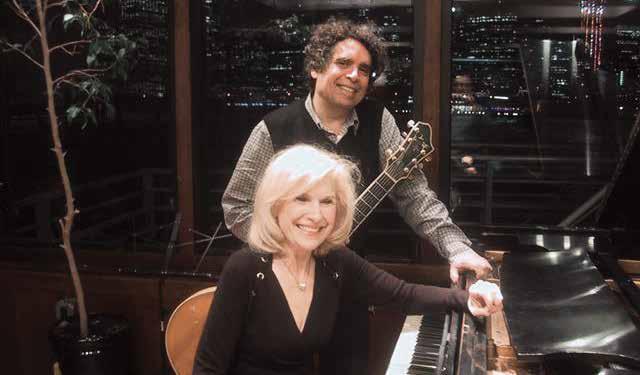
Jess Klein $20. 7:30 p.m. The ArtsCenter, Carrboro.
Joshua Kendrick 3 p.m. Tin Roof, Raleigh.
Live Band Karaoke with The Blind Tigers 9 p.m. Rubies on Five Points, Durham.
Live Music with Rabbi Sandra 4 p.m. Lanza’s Cafe, Carrboro.
The National Parks $20+. 8 p.m. Cat’s Cradle, Carrboro.
Old Dominion with Tyler Hubbard and Kylie Morgan: No Bad Vibes Tour $50+. 7:30 p.m. PNC Arena, Raleigh.
Peridot Sun 4 p.m. Durty Bull Brewing Company, Durham.
The Pink Triangle Goes ’90s $10+. 9:30 p.m. The Fruit, Durham.
Tommy Niemann Band 6:30 p.m. Tin Roof, Raleigh..
STAGE
Brincos Dieras: Elite Comedy Fest $126+. 8 p.m. Martin Marietta Center for the Performing Arts, Raleigh.
The ComedyWorx Show Matinee $9. Saturdays at 4 p.m. ComedyWorx, Raleigh.
Nimesh Patel: Fast and Loose Tour $35+. 7 p.m. DPAC, Durham.
Primetime at ComedyWorx $15. Saturdays at 8 p.m. ComedyWorx, Raleigh.
Tom Papa: 2023 Comedy Tour $36+. 8 p.m. The Carolina Theatre, Durham.
COMMUNITY
Streetery: Baile en la Calle 5 p.m. CCB Plaza, Durham.
MUSIC
Adeem the Artist $15. 8 p.m. The Pinhook, Durham.
Alfredo Rodríguez $15+. 8 p.m. The Carolina Theatre, Durham.
Carrboro Music Festival
Hip Hop & R&B Showcase 2 p.m. Cat’s Cradle Back Room, Carrboro.
Mustard Service $18. 8 p.m. Motorco Music Hall, Durham.
Raphael Saadiq Revisits Tony! Toni! Toné! $65+. 8 p.m. DPAC, Durham.
Tav Falco’s Panther Burns $12. 8 p.m. The Pour House Music Hall, Raleigh
STAGE
TEDx Raleigh 2023 $45. 1 p.m. Sheraton Raleigh Hotel, Raleigh.
ART
Closing Reception: Amy Herman 3 p.m. Peel Gallery, Carrboro
MUSIC
Ashnikko $56. 7 p.m. The Ritz, Raleigh.
Leigh Nash / Jeremy Lister $20. 8 p.m. Cat’s Cradle Back Room, Carrboro.
ART
Frank in Focus 2023 Oct. 2-30, various times. FRANK Gallery, Carrboro.
MUSIC
Gash $10. 8 p.m. The Pinhook, Durham.
Gregory Alan Isakov $40+. 7:30 p.m. DPAC, Durham.
Hozier: Unreal Unearth Tour $303+. 7:30 p.m. Red Hat Amphitheater, Raleigh.
Jeremy “Bean” Clemons Trio $8. Tuesdays at 9 p.m. Kingfisher, Durham.
Jessy Lanza $18. 8 p.m. Motorco Music Hall, Durham.
Mike Campbell & the Dirty Knobs $37+. 8 p.m. The Carolina Theatre, Durham.
Shovels and Rope $35. 8 p.m. Haw River Ballroom, Saxapaha.
PAGE
Sandra Gutierrez: Latinísimo 7 p.m. Quail Ridge Books, Raleigh.
INDYweek.com September 20, 2023 45 FIND OUR COMPLETE COMMUNITY CALENDAR AT INDYWEEK.COM/CALENDAR FRI 9/29 SAT 9/30 SUN 10/1 MON 10/2 TUES 10/3
Howard Alden and Lenore Raphael perform at Sharp 9 Gallery on Saturday, September 30.
C U LT U R E CA L E N DA R C U LT U R E CA L E N DA R
PHOTO COURTESY OF SHARP 9 GALLERY
U Z Z L E S
If you just can’t wait, check out the current week’s answer key at www.indyweek.com, and click “puzzle pages” at the bottom of our webpage.


su | do | ku
© Puzzles by Pappocom
There is really only one rule to Sudoku: Fill in the game board so that the numbers 1 through 9 occur exactly once in each row, column, and 3x3 box. The numbers can appear in any order and diagonals are not considered. Your initial game board will consist of several numbers that are already placed. Those numbers cannot be changed. Your goal is to fill in the empty squares following the simple rule above.

If you just can’t wait, check out the current week’s answer key and previous puzzles at indyweek.com/puzzles-page
Best of luck, and have fun!
this week’s puzzle level: 09.20.23

46 September 20, 2023 INDYweek.com INDY CLASSIFIEDS classy@indyweek.com
C L A S S I F I E D S
HEALTH & WELL BEING

Projection Lecture Friday
Jungian Psychoanalyst Howard Tyas, Jr
$10 Lecture 9/22/23 7:30pm “Who am I to you?”
$60 Workshop 9/23/23 10am-4pm
“Navigating the Intersection of our Inner and Outer Lives”
Church of Reconciliation, Chapel Hill JUNGNC.ORG (919)604-0427
SERVICES

919-416-0675 www.harmonygate.com

EMPLOYMENT
Senior Software Engineer
Senior Software Engineer sought by LexisNexis USA in Raleigh, NC to interface w/ other technical personnel or team members to complete complex tasks. Minimum of Bachelor’s degree or foreign equiv in Computer Science, Computer Engg, or rltd + 3 yrs of exp in job offered or rltd occupations required. EE reports to LexisNexis USA office in Raleigh, NC but may telecommute from any location within US. Interested candidates apply by mail to T. Hayward, RELX Inc; 1000 Alderman Dr, Alpharetta, GA 30005. Ref job code: 01004.
Consulting Software Engineer
Consulting Software Engineer sought by LexisNexis USA in Raleigh, NC to serve as primary technical point of contact for external technology resources. Minimum of Bachelor’s degree or foreign equiv in Computer Science or rltd + 7 yrs exp in job offered or rltd occupations required. EE reports to LexisNexis USA office in Raleigh, NC but may telecommute from any location within US. Interested candidates apply by mail to T. Hayward, RELX Inc; 1000 Alderman Dr, Alpharetta, GA 30005. Ref job code: 00906. 7
Production Planner
Production Planner sought by Grifols Therapeutics LLC for the Clayton location. Candidate must have a Bach’s or foreign equiv deg in Industrial Engg & 2 yrs of exp in the supply planning process for pharmaceutical production. Must have exp in: Documenting the WIP inventory using ERP to reduce internal lead times. Coord’g activities in a production weekly schedule to maximize production output. Maintaining Material Master Data according to BOM approved in relation to production items. Determining the appropriate material code in the BOM components list. Determining the batch to be manufactured according to the cGMP reqmts & the valid BOM. Creating & releasing production orders in SAP system C001 transaction.
Creating Purchase Requisitions by ME51N in SAP. To apply, Send resume to Attn: HR Staffing/PERM, 8368 US-70 BUS Highway West, Clayton, NC 27520 or apply online: www.grifols.com/careers. EOE.
Sr Global Marketing Manager
Teleflex LLC seeks a Sr Global Marketing Mgr (GM-SK) in Morrisville, NC (up to 25% unanticipated int’l & dom travel req’d) to provide day-to-day mgmt of designated product line(s) issues, programs, & sales support. Reqs BS+5 yrs prog, rltd exp or MS+2 yrs rltd exp. Email resume to tfxjobs@teleflex.com
Design Quality Engineers Durham, NC area. Providing quality-engineering support to new product development projects. Maintain QMS procedures to ensure compliance to medical device regulations. Some work from home available. Send res to: Baebies, Inc., hr@baebies.com.

INDYweek.com September 20, 2023 47 INDY CLASSIFIEDS classy@indyweek.com
LAST ISSUE’S PRINT PUZZLE


 Raleigh | Durham | Chapel Hill September
Raleigh | Durham | Chapel Hill September

 LGBTQ CENTER OF DURHAM STAFF & DESMERA GATEWOOD
LGBTQ CENTER OF DURHAM STAFF & DESMERA GATEWOOD
 SPENCER GRIFFITH
SPENCER GRIFFITH


 PHOTO COURTESY OF MOTORCO
PHOTO COURTESY OF MOTORCO




















































































 BY DESMERA GATEWOOD backtalk@indyweek.com
BY DESMERA GATEWOOD backtalk@indyweek.com













































 BY NICK MCGREGOR music@indyweek.com
BY NICK MCGREGOR music@indyweek.com




































